


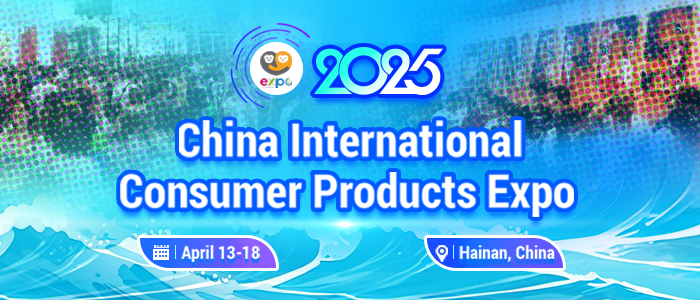
As a living memory to the Maritime Silk Road and a window to the openness of Hainan Free Trade Port, Haikou's Qilou Old Street architecture bridges Eastern and Western civilizations through its iconic covered walkways.
In this centuries-old historic quarter, every corner carries the aroma of traditional laobacha (Old Dad's Tea), while weathered wooden tables whisper tales of ancestors who journeyed to nanyang (south seas).

HAIKOU -- The 5th China International Consumer Products Expo (CICPE) attracted the participation of a record-breaking 1,767 companies and 4,209 consumer brands from 71 countries and regions this year, according to a press briefing on Friday.
Events targeting global brands, e-commerce and country-specific suppliers led to 52 intended cooperation agreements, the value of which amounted to approximately 92 billion yuan (about $12.6 billion), said Zeng Rong, chief economist at Hainan provincial bureau of international economic development.
Countries including Slovakia, Singapore, Brazil, Armenia and Kazakhstan debuted their national pavilions at this year's CICPE in South China's Hainan province. The United Kingdom, as the 2025 guest country of honor, occupied an exhibition area of over 1,300 square meters, showcasing 53 brands across the fashion, beauty, homeware, health and jewelry industries, doubling its 2024 presence.
More than 60,000 professional purchasers attended -- representing a 10 percent increase from last year. In tandem with the expo, the Ministry of Commerce also launched the "Shopping in China" campaign to stimulate domestic consumption, and introduced a dedicated exhibition to facilitate cooperation between foreign trade firms and domestic purchasers.
Preparations for the 6th CICPE are underway, with hundreds of companies already registered or signed on to participate in the next edition of this event.
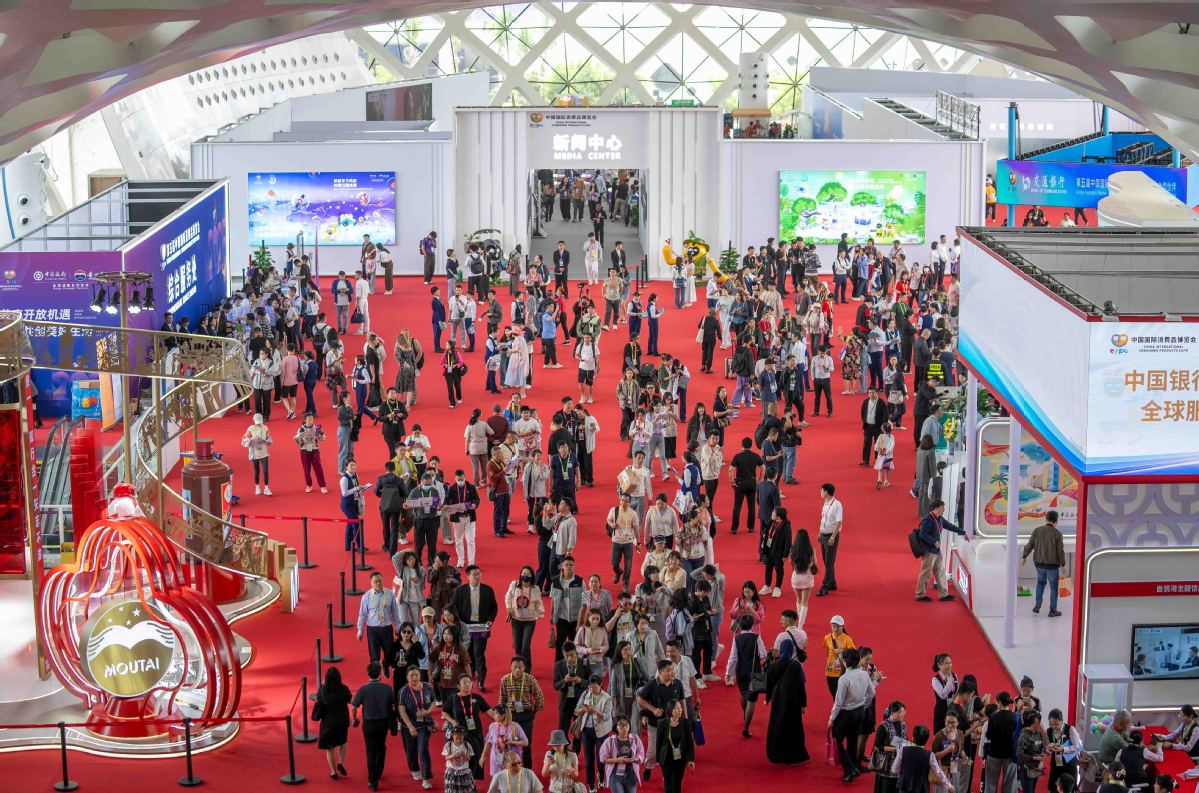
HAIKOU - Driven by booming tourism, innovative policies and robust retail growth, China's island province of Hainan is rapidly becoming a vital domestic and international consumption destination, said a white paper released during the ongoing 5th China International Consumer Products Expo (CICPE).
"The 2025 Hainan Travel Retail White Paper" was jointly released by KPMG China and the Moodie Davitt Report at the 5th Global Consumption Innovation & Duty Free and Travel Retail Exchange Event. Part of the CICPE, the event convened industry leaders, policymakers and international brands to explore opportunities in retail tourism and the island's pioneering economic reforms.
The white paper underscored that Hainan's tourism revenue has grown steadily in recent years, supported by dynamic shifts from traditional retail to new consumption models and the expansion of duty-free shopping.
Since the start of 2024, the island province has introduced multiple measures to strengthen its appeal to international visitors, positioning itself as a high-quality tourism market competing on the global stage.
A key insight from the white paper is the dominance of younger consumers in Hainan's retail tourism sector, with travelers born in the 1990s and 2000s accounting for over 50 percent of Hainan's tourists in the first three quarters of 2024.
These tech-savvy, trend-conscious consumers prioritize diverse shopping experiences, fueling demand for cosmetics, skincare, luxury goods and electronics.
"The preferences and purchasing power of young consumers are redefining Hainan's retail landscape," noted the report.
The province's investment in introducing new tourism methods has further attracted this demographic, offering retailers a roadmap for future growth.
At the governmental level, Hainan is leveraging institutional innovations to enhance its business environment and boost fair competition within the free trade port framework. Marketwise, the island is advancing its international profile by tapping into China's accelerated opening-up of the tourism industry and expansion of the global travel market.
The white paper emphasized Hainan's dual role in attracting domestic high-spending tourists and boosting overseas consumption, solidifying its status as a global tourism and retail nexus.
"Going forward, Hainan's travel retail market is poised for development and is expected to become an important global hub for travel retail," the report said.
As China's first major international exhibition of the year and the nation's sole state-level event dedicated to consumer goods, the 5th CICPE has attracted over 1,700 enterprises and 4,100 brands from more than 70 countries and regions.
In 2024, Hainan received a record-high 97.21 million tourist visits, up 8 percent year-on-year. Total tourism revenue exceeded 204 billion yuan ($28.3 billion), rising 12.5 percent, with per capita spending showing notable growth. The island welcomed 1.11 million inbound tourists over the same period, surging 115.6 percent year-on-year.

HAIKOU — A seamless integration of cutting-edge technologies into daily life is taking center stage at the ongoing fifth China International Consumer Products Expo in South China's Haikou, Hainan province, painting a vivid picture of a smarter, more interconnected future.
Slated from April 13 to 18, this year's expo features for the first time dedicated exhibition zones for groundbreaking innovations in artificial intelligence and the low-altitude economy.
Tech giants like Huawei and China Mobile are showcasing futuristic solutions. Huawei's HarmonyOS ecosystem demonstrates cross-device synergy across "people, vehicles, and homes", featuring AI-powered eye-tracking technology for hands-free e-book navigation.
China Mobile's smart home ecosystem includes quadruped robotic companions for elderly care and AI-driven home security systems.
"AI is accelerating its integration into everyday scenarios. The expo is undoubtedly a major platform to showcase these advances," said Zhan Wenyu, vice-president of AI company iFLYTEK, which has participated in the expo for five consecutive years.
The expo's dedicated AI zone displays humanoid robots capable of complex tasks, such as dancing in traditional local Li ethnic brocade costumes or handling delicate objects.
Tesla's latest humanoid robot boasts enhanced mobility and tactile sensitivity, while the Ti5 Robot unveils breakthroughs in electric drive technology with lightweight joint modules and smart dexterous hands.
Health and wellness technologies also claim a prominent spotlight. Continuous glucose monitors and light therapy glasses under various brands further spotlight the fusion of tech and well-being, while brain-computer interfaces highlight advancements in medical accessibility companies like SenseTime and Asus are presenting smart health ecosystems at the event.
Brands like OSIM and Ogawa have debuted AI massage robots. Air Nutri Solution Inc, a Vancouver, Canada-based non-medicinal sleep solutions provider, has introduced its "deep sleep cabin", which uses charged particle waves to create immersive rest environments.
OSIM sees the expo as a key platform for engaging in meaningful conversations with global consumers, said Lin Xiaohui, deputy general manager of brand management and marketing of OSIM North Asia.
Making its debut this year, the low-altitude economy zone showcases electric vertical takeoff and landing aircraft, flying cars and drones.
Autonomous vehicles served expo attendees, offering driverless shuttles and cleaning services around key venues, providing a glimpse into smart city logistics.
United Aircraft brought the TD550, which obtained the first type of certificate for unmanned helicopters in China, to the exhibition. "China is entering an era of rapid development of the low-altitude economy," said Zhou Xiaoyue, the firm's public relations director.
"The Hainan Free Trade Port provides unprecedented opportunities for the innovation of the drone industry," Zhou said, adding that the firm will work with global partners through the expo platform to promote the industrial implementation of the low-altitude economy.
Xinhua

HAIKOU — The fifth China International Consumer Products Expo, held in the tropical island province of Hainan, has reaffirmed the country's position as a vital marketplace for global enterprises.
This year's expo has drawn record participation from over 4,100 brands across 71 countries and regions, reflecting the expanding international appetite for engagement with China's vast consumer market and its evolving landscape.
The United Kingdom, this year's guest country of honor, brought 27 companies spanning fashion, beauty, and other fields. Flagship brands like Burberry and Bentley showcased their latest offerings, with a strong emphasis on green technology and sustainable development.
"I have seen the tremendous innovation and growth taking place within China's economy in recent years, not least in digital technologies, life sciences and green energy," said Douglas Alexander, minister of state of the UK's Department for Business and Trade.
These areas present significant opportunities for both economies, he said, emphasizing the UK's commitment to deepening economic ties with China.
Burberry Greater China President Josie Zhang noted the value of the expo in facilitating foreign firms to engage with local partners. "By deepening cooperation with various stakeholders, we aim to explore new market opportunities and achieve mutual growth," she said in a written interview with Xinhua.
Slovakia also made a notable debut with its first-ever national pavilion.
Andrea Jancekova, CEO of Slovak brand Truscada, praised the expo's global reach. "You can have a good connection also with people from all over the world."
Slovak Deputy Prime Minister Denisa Sakova highlighted the expanding trade ties between the two countries. "China is one of our most important trading partners outside the European Union," she said. "The growing volume of trade is a testament to the strength and dynamism of our economic relationship."
Among the newcomers was Japan's Eda Livestock Co Ltd, known for its premium Wagyu beef. "We plan to establish a foreign trade company in Hainan as our strategic entry point into the Chinese market," said Rei Tanaka, the firm's chief operating officer, who participated in the CICPE for the first time.
This year's expo also gathered an array of top-tier global luxury brands. Richemont's TimeVallee debuted as an independent exhibitor, while LVMH and Kering Group brands made notable appearances, reflecting confidence in China's premium consumption growth.
"Luxury consumers in China are significantly younger than those in many overseas markets, and that presents a major opportunity for us," said Nancy Liu, president of luxury travel retailer DFS China. The company has introduced tailored services to cater to the expectations of these emerging consumer groups.
Beyond luxury, sectors like automotive technology are repositioning China from being a mere sales destination to a research and innovation hub.
Amid China's technological innovation momentum, this year's expo for the first time introduced dedicated zones for artificial intelligence and the low-altitude economy, showcasing cutting-edge technologies and products from leading tech companies around the world.
"Since 2020, Volkswagen has invested over 10 billion euros ($11.36 billion) in China. In particular, we established a research and development center in China in 2023, the largest outside Germany, "said Su Bahong, vice-president of Volkswagen Group China. "This shows a trend where China is becoming the global technological innovation hub."
Xinhua

The transformation of Chinese consumption habits is accelerating, with consumers poised to boost spending on leisure, entertainment and healthcare goods and services as they shift from basic material satisfaction to aspirational and personalized consumption, a new report said.
The report, released by CITIC Securities during the fifth China International Consumer Products Expo in Haikou, Hainan province, which concludes on Friday, said the digital economy and biotechnology are fueling new consumption trends in China and posing challenges to traditional consumption patterns.
China's super large market is unleashing enormous potential. Fueled by the country's ongoing consumption upgrade trend and the Healthy China 2030 initiative, a national guideline aimed at promoting overall health, the healthcare sector is undergoing unprecedented changes, and major foreign companies said they would continue to increase investments in China.
OSIM International Pte Ltd, a Singapore-based health products provider, accounts for the top market share in the massager market in Asia, and it has been participating in the consumer expo for five straight years. Sales have maintained growth in the past few years in China, its largest market globally.
The company said the operation of brick-and-mortar stores serves as its cornerstone. After the first edition of the consumer expo, it launched a store in Haikou, and this year, it plans to upgrade the store to the highest level that sells various kinds of high-end products.
Besides top-tier cities such as Beijing, Shanghai, Guangzhou and Shenzhen in Guangdong province, OSIM has seen rosy sales in Chinese cities such as Hangzhou, Zhejiang province; Chengdu, Sichuan province; and Suzhou, Jiangsu province, and its main consumer group is aged between 35 and 45.
"We have always had confidence and optimism in China, a highly diverse market. In China, an increasingly growing elderly population is paying more attention to healthcare," said Lily Yang, associate brand director of OSIM China.
"Besides, cervical spine discomfort is becoming a concern for many young people who have been busy with work, and they have indicated higher demand for massagers. A growing demand for sports assistive devices among sports enthusiasts has also become a key driving factor for the development of the massager market," Yang said.
Meanwhile, Charoen Pokphand Group or CP Group, a Thail international conglomerate with interests ranging from agriculture, food, finance to automobiles, pharmacies and manufacturing, has been a five-time participant of the expo. It has been a supporter and beneficiary of the event, and will continue to be deeply involved in the development of Hainan, it said.
The company has developed functional food for sleep aid and bone protection with its partner, and over the past three years, the average annual sales growth rate of such products has been 45 percent in China.
"Many Generation Z consumers (those born between 1995 and 2009) tend to stay up late while taking liver protection healthcare products. This phenomenon is a kind of precise demand for healthcare products consumption," said Zhang Shuhui, senior president of CP Group.
By 2030, the total market size of the health services sector in China is expected to reach 16 trillion yuan ($2.2 trillion), according to the projection by the National Health Commission.
"The application of synthetic biology in agriculture, food and beauty is worth paying attention to," said Jiang Ya, chief consumer industry analyst at CITIC Securities.

The global yachting world turned its attention to Sanya, Hainan province this week as the fifth China International Consumer Products Expo, held from Sunday to Friday in the provincial capital of Haikou, hosted its first dedicated international yachting exhibition in the coastal city, featuring 62 companies from over 20 countries and more than 150 vessels.
The exhibition, held as the expo's first sub-venue in Sanya, aims to foster collaboration across the yachting industry's production, education, research, innovation and investment segments.
At Tuesday's opening ceremony, the Sanya Cruise and Yacht Association issued the "Sanya Initiative for the Yacht Industry", calling on businesses, industry groups, research institutions and governments worldwide to build an open, innovative and sustainable yachting ecosystem.
The proposal seeks to position Sanya as a hub for exploring new pathways for China's yachting sector.
Spanning about 166,800 square meters, the exhibition utilizes existing marina infrastructure, underscoring the city's push to expand its yachting economy.
In recent years, Sanya has enhanced its maritime appeal by upgrading port facilities and diversifying services, including yacht rentals, sales and event hosting. The city has also cultivated niche markets such as yacht wedding photography and educational boating tours. Efforts to lower entry barriers have spurred growth in hybrid marine sectors.
By late 2024, registered yachts in Sanya reached 1,415, and it now hosts 7,300 yacht-related enterprises, accounting for 22.7 percent of China's total, according to Hainan Daily.
Wang Qiyang, Party secretary of Sanya, said the city will continue developing as a core zone for international tourism consumption while advancing reforms in yachting. Plans include integrating yachting with tourism, exhibitions and cultural creativity, with a long-term goal of establishing a full industrial chain — from research and manufacturing to sales and maintenance — in order to solidify Sanya's reputation as the "Yachting Capital of the Asia-Pacific".
Li Gang, director-general of the department of market operation and consumption promotion at the Ministry of Commerce, said China's yachting market has grown steadily due to rising living standards and policy improvements. The ministry will support regions in developing yacht-friendly policies, infrastructure and public marinas while encouraging businesses to innovate with "yacht+" products to expand consumer access.
The yacht show highlights Sanya's ambition to become a global leader in the maritime leisure industry.

British businesses are seizing the spotlight as the United Kingdom takes center stage at the 5th China International Consumer Products Expo in Haikou, Hainan province, with exhibitors expressing optimism about the vast potential of the Chinese market.
The UK, this year's Guest Country of Honor, has brought 27 brands spanning foods and beverages, personal wellness, fashion and sporting goods to the ongoing expo, which runs from Sunday to Friday.
Claire Urry, chief commercial officer of the China-Britain Business Council, said the event underscores China's growing importance as a key market amid global economic challenges.
"Companies are developing their strategies for China, and we're already seeing results — one exhibitor just signed a memorandum of understanding with a Chinese partner to localize packaging and production here, giving them a cost advantage," Urry said.
"Strengthening trade ties benefits both countries, and we're committed to supporting these partnerships."
Among the British participants is the Royal Botanic Gardens, Kew, a UNESCO World Heritage Site, which is showcasing plant-based skincare products inspired by its botanical research.
"This expo is a unique platform to highlight our sustainability ethos," said Alex Chen, a business partner with Kew. The brand's hand creams, soaps and fragrances feature scents derived from its gardens and packaging modeled after historic plant atlases.
Tea specialist Whittard of Chelsea is using the expo to introduce its blends to South China consumers. "Hainan attracts tourists from across China, so it's perfect for expanding our reach," said Katherine Oon, Whittard's senior China manager. The company is conducting daily tea tastings in the morning and afternoon to engage international visitors.
Meanwhile, tableware brand Denby is capitalizing on China's demand for premium home goods. The company is launching bowls and plates tailored for Chinese cuisine, emphasizing durability and nontoxic materials.
With Hainan Free Trade Port's booming tourism and trade-friendly policies, British brands see a lucrative foothold in the Chinese market. "The enthusiasm here confirms our confidence in China's economic growth," Urry said.
Sanya is transforming its yacht economy with Free Trade Port policies, unlocking diverse opportunities across luxury and mass consumption sectors. Key benefits include duty-free yacht imports, 183-day guarantee-free berthing for foreign yachts, and convenient access to open waters for cruising. As a vital part of the maritime economy, yacht tourism is expanding Hainan's tourism offerings from land to sea, reaching 100-200 nautical miles offshore. In the future, superyachts will facilitate tourism across unlimited navigation areas, showcasing the Free Trade Port's open vitality of "thriving through marine development".

New innovations in the low-altitude economy are on display at the ongoing 5th China International Consumer Products Expo held in Haikou of Hainan province, China News Service reported on Tuesday.
"We hope to see more visitors tour around Hainan island in manned airships in the future," said Xin Guozhong, deputy general manager of Shenzhen Yingzhao Airlines Co. The civil manned airship AS700 has drawn attention due to its streamlined gas bag shape. Compared to other aircraft, the biggest advantage of airships is that they can stay airborne longer, offering breathtaking natural scenic views to tourists, enhancing their sightseeing experience.
The expo brings together leading enterprises to showcase a range of trailblazing products covering unmanned aerial vehicle (UAV) equipment manufacturing, three-dimensional traffic control systems, flight training and low-altitude flying scenario applications.
EHang's EH216-S, a pilotless passenger-carrying aerial vehicle, is on display, showcasing its potential in sectors such as manned transportation, aerial tourism, aerial logistics and medical emergency response. With a flight endurance range of up to 30 kilometers, the vehicle effectively offers an efficient alternative to congested roads, a staff member at EHang's booth said.
XPeng AeroHT is also showcasing its groundbreaking modular flying car, the "Land Aircraft Carrier". With a large rear cabin that can contain an aircraft, the vehicle overcomes difficulties in moving and storage, meeting demands both on daily routine and outdoor exploration, as well as low-altitude tour and emergency service.
China's low-altitude economy has seen rapid growth in recent years, with its market size exceeding 500 billion yuan ($68.25 billion) in 2023. It is projected to reach 1.5 trillion yuan in economic size this year, according to data collected by China News Service.
Hainan, ranked 4th nationwide for its low-altitude economy business in 2024, continues to attract multiple enterprises to set up their business in Hainan, said Jiang Hong, deputy director of the Hainan Provincial Development and Reform Commission.

HAIKOU -- At the fashion lifestyle exhibition area of the ongoing 5th China International Consumer Products Expo in Haikou, capital of South China's Hainan province, six brands under Volkswagen Group China, including Volkswagen, Audi, Porsche and Bentley, showcased the latest advancements in luxury and electric mobility.
This marks the third consecutive year that the German automaker has participated in the expo.
Liu Yunfeng, executive vice-president of Volkswagen Group China, said that the presence of 11 models from the company's various brands at this year's expo fully demonstrates their long-term commitment and strong confidence in the Chinese market.
Meanwhile, as part of the strategic cooperation between the company and Hainan, projects in the fields of energy and charging are progressing steadily.
Liu said that the company places great importance on the Chinese market and is optimistic about the potential of the Hainan Free Trade Port (FTP). The group will continue to strengthen communication and cooperation with Hainan.
Leveraging the opening policies of the Hainan FTP, the group will steadily advance strategic cooperation across several fields, contributing jointly to the development of Hainan in sustainable mobility, he added.
Looking ahead, Liu noted that Volkswagen Group China will continue to deepen its engagement with the Chinese market, offering a rich product range and forward-looking technological solutions to provide local consumers with an even better electric mobility experience.
Volkswagen Group China plans to launch about 40 new models in the Chinese market from 2025 to 2027, with more than half of them being new energy vehicles. By 2030, the group will release over 30 pure electric models in the Chinese market.
Ducati, a leading motorcycle brand of Volkswagen Group China, showcased two classic motorcycle models this year, which captivated the attention of many visitors. Fabio Lambertini, CEO of Ducati China, said it was the third time that Ducati had participated in the expo.
"The Chinese market is making continuous evolution," said Lambertini, noting that Ducati is thus shaping an "in China, for China" strategy that perfectly fits the local needs.
Regarding Hainan, Lambertini believed the province is a vital hub for China and for Ducati as well, adding that Hainan's excellent roads along the seaside and in the mountains could offer an opportunity to invest further on the island.
As the largest consumer products exhibition in the Asia-Pacific region, the expo is being held in Hainan from April 13 to 18, drawing participation from over 4,100 brands across 71 countries and regions.
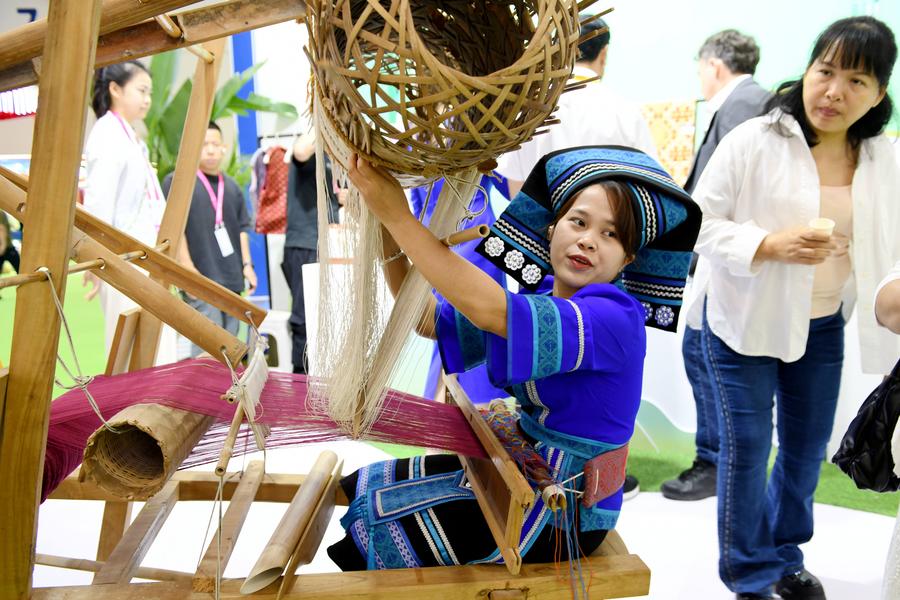
HAIKOU - With innovative design and display forms, intangible cultural heritage products from all over the country, ranging from traditional handicrafts to specialty food, are showcased at the expo to demonstrate the profound heritage of traditional Chinese culture and attract the attention of many visitors.

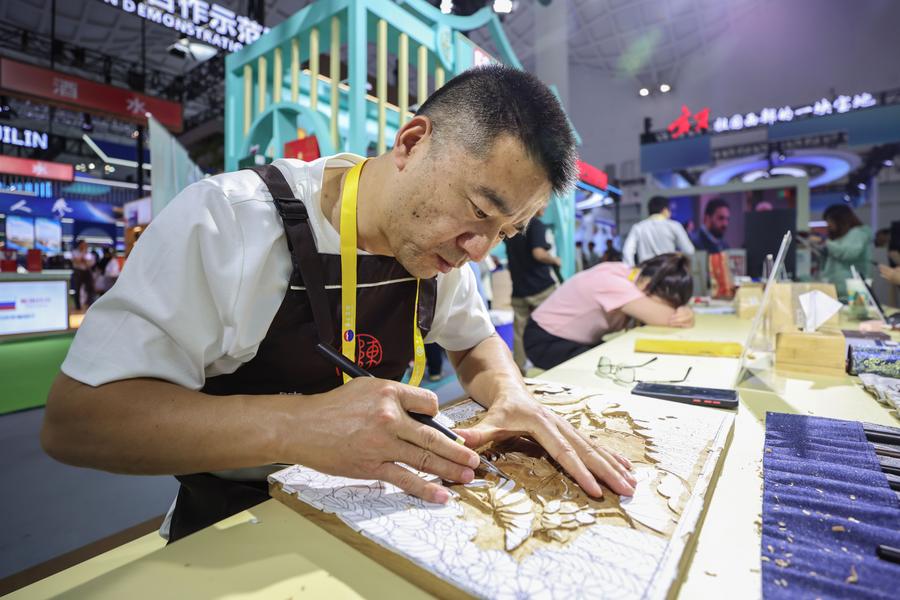
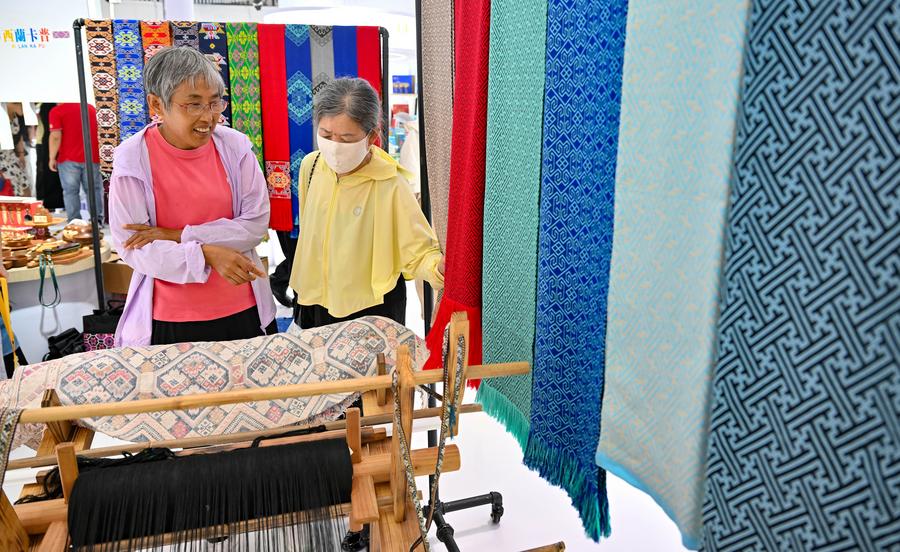
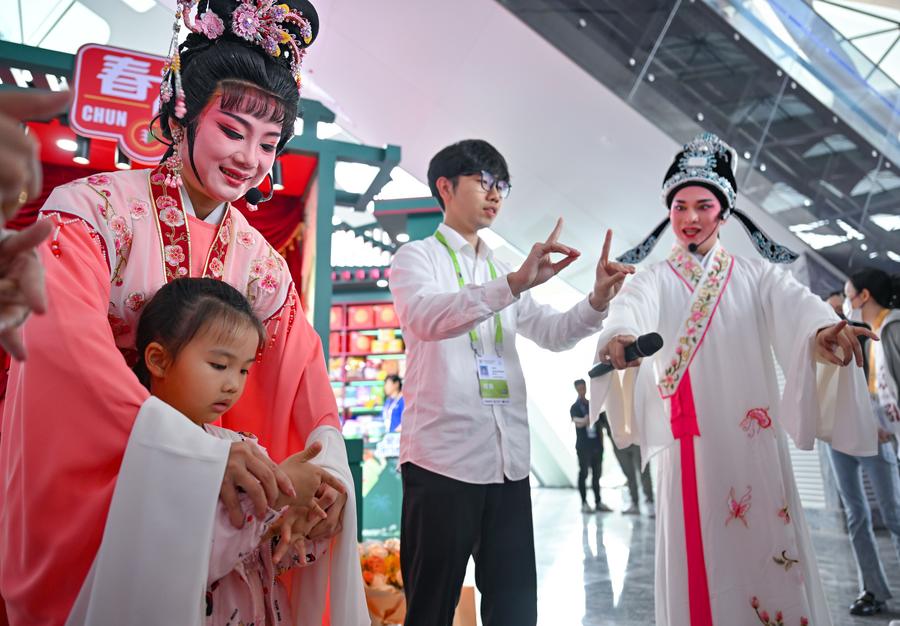
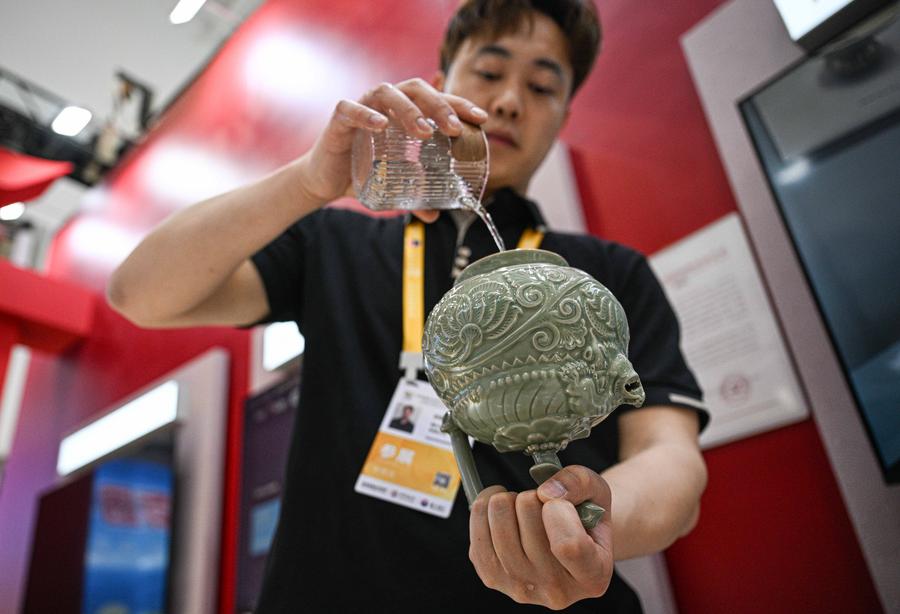
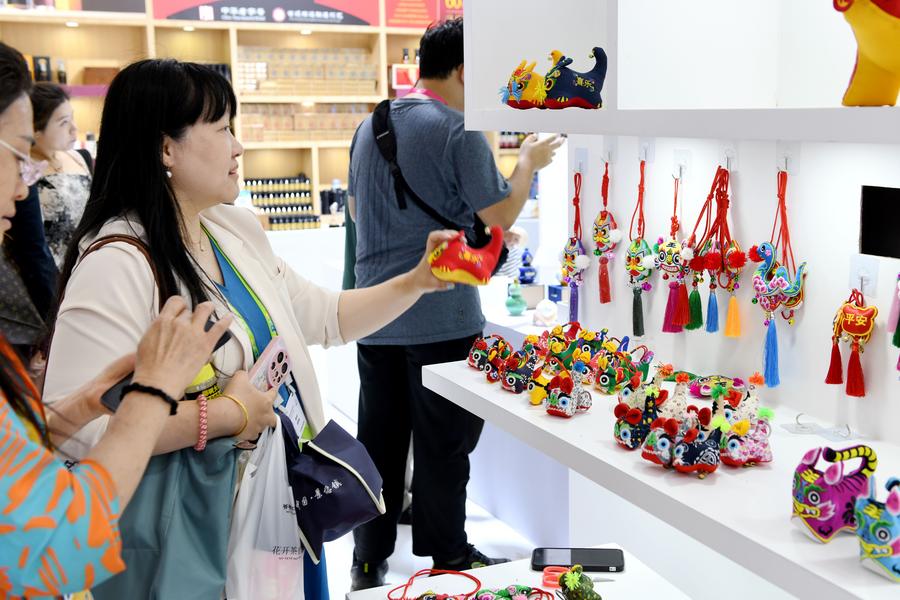
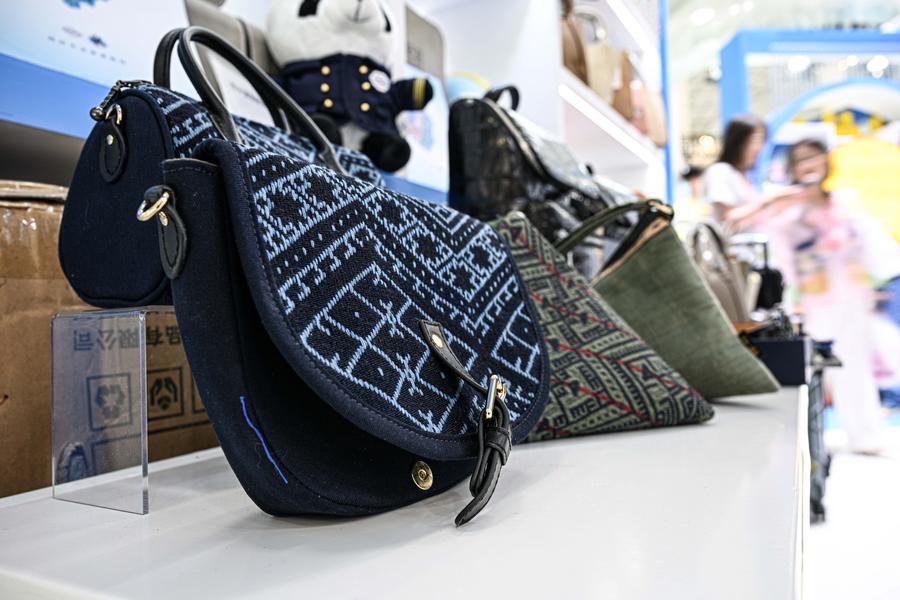
This week, the world's gaze converges once again on the coast of the South China Sea – Haikou, Hainan province. A total of 71 countries and regions, about 1,700 enterprises, and over 4,100 brands have converged here, forming a gravitational field for global premium goods, with the scale reaching a new high. CICPE serves as the "world's showcase" for the closed-loop operation of the Hainan Free Trade Port and a grand declaration of China's pursuit of further high-level opening-up. Let's take a look!

As the complexity, severity and uncertainty of the external environment continue to intensify, China's foreign trade has been seeing certain pressure, and the government will help guide the nation's exporters to find more business opportunities in the super large-scale domestic market, a senior official said.
Sheng Qiuping, vice-minister of commerce, made the remarks during the ongoing fifth China International Consumer Products Expo in Haikou, Hainan province, which will conclude on Friday.
China has been the largest country in terms of merchandise trade for eight consecutive years. Last year, the country's foreign trade business value topped 4.3 trillion yuan ($588.2 billion) for the first time, up 5 percent year-on-year, said the General Administration of Customs.
Amid tariff increases by the United States and growing economic fragmentation worldwide, the global industrial chain has been impacted, and increasing duties place significant pressure on China's foreign trade sector.
"We will guide local governments, business associations and e-commerce platforms to help China's foreign trade companies expand their domestic market by utilizing the advantage of the country's super-large scale market and resist the impact of foreign trade pressures," Sheng said.
He added that the government would mainly help 10 provinces with high volume foreign trade business and consumption by expanding domestic sales channels. For instance, the government will help cultivate an integrated services platform for domestic and foreign trade, and guide enterprises to achieve more orders and stabilize operations.
China's major e-commerce platform JD said that beginning May 1, the company will invest 200 billion yuan to purchase foreign trade products for domestic sales, and establish a special section for sales of high-quality foreign trade products, relying on its self-operated model and supply chains.
For offline business, foreign trade enterprises will be guided to showcase and sell their products at pedestrian streets and commercial complexes in major cities, and the Ministry of Commerce will hold more types of promotional events in the next step.
Such an effort will help build a dual-circulation development pattern, the ministry said, meaning internal economic circulation will act as the mainstay of economic growth, while domestic and external markets will complement each other.
China wields great power when it comes to tackling trade pressure, as it has a huge domestic market with 1.4 billion potential consumers.
With the ongoing consumption upgrade trend, the country has a lot of opportunities to expand the domestic market if there are supplies of high-quality, new type products that meet the needs of domestic consumers, said Peng Jianzhen, president of the China Chain Store and Franchise Association.
"Chinese retailers such as Yonghui Superstores said they welcome foreign trade companies to discuss potential cooperative deals with them. In addition, business associations that are responsible for exports and domestic sales have united together to help foreign trade companies overcome difficulties," Peng said.
As early as April last year, Hainan released a group of optimization measures to help accelerate the integration of domestic and foreign trade, and the province's government work report this year stated that it will promote the integrated development of domestic and foreign trade.
In developed countries, after average annual per capita GDP exceeds $10,000, residents will accelerate their transition from material consumption to mid-to-high-end and personalized consumption, and China is undergoing such a transformation, said a report by CITIC Think Tank.
About 260 million Generation Z consumers — those born between 1995 and 2009 — stand as the core force driving growth of such a trend, and their purchasing power is on the rise, the report said.
"We expect a clear upward trend for goods consumption such as fragrances, jewelry, beauty supplies, luxury products and IP products. For services consumption, leisure, entertainment and wellness consumption is on the rise," said Jiang Ya, chief consumer industry analyst from CITIC Securities.
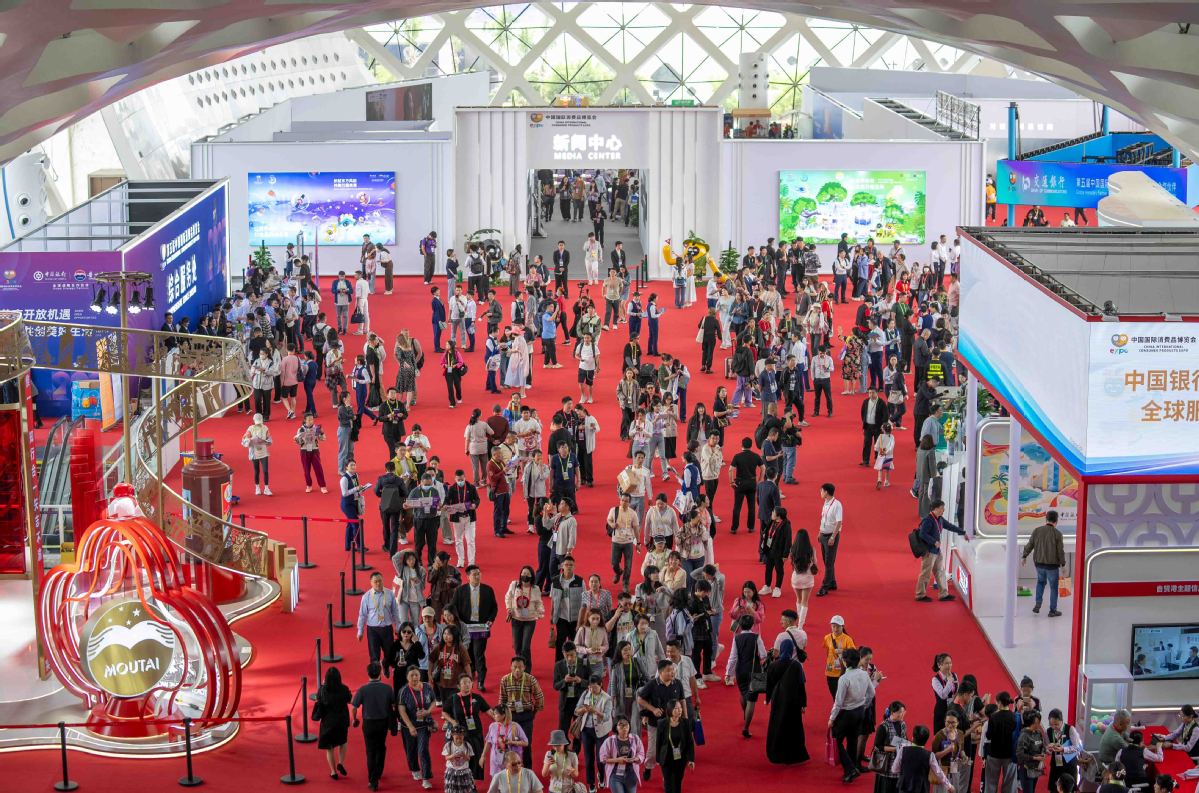
The 5th China International Consumer Products Expo opened on Sunday with Beijing as the guest city, high-tech medical debuts, and a new Hainan food showcase, drawing global brands to explore China's consumer market potential.
The expo runs through April 18 in Haikou. Beijing was selected as the guest city for the first time at the CICPE, hosting a themed promotion day on Monday at the Hainan International Convention and Exhibition Center.
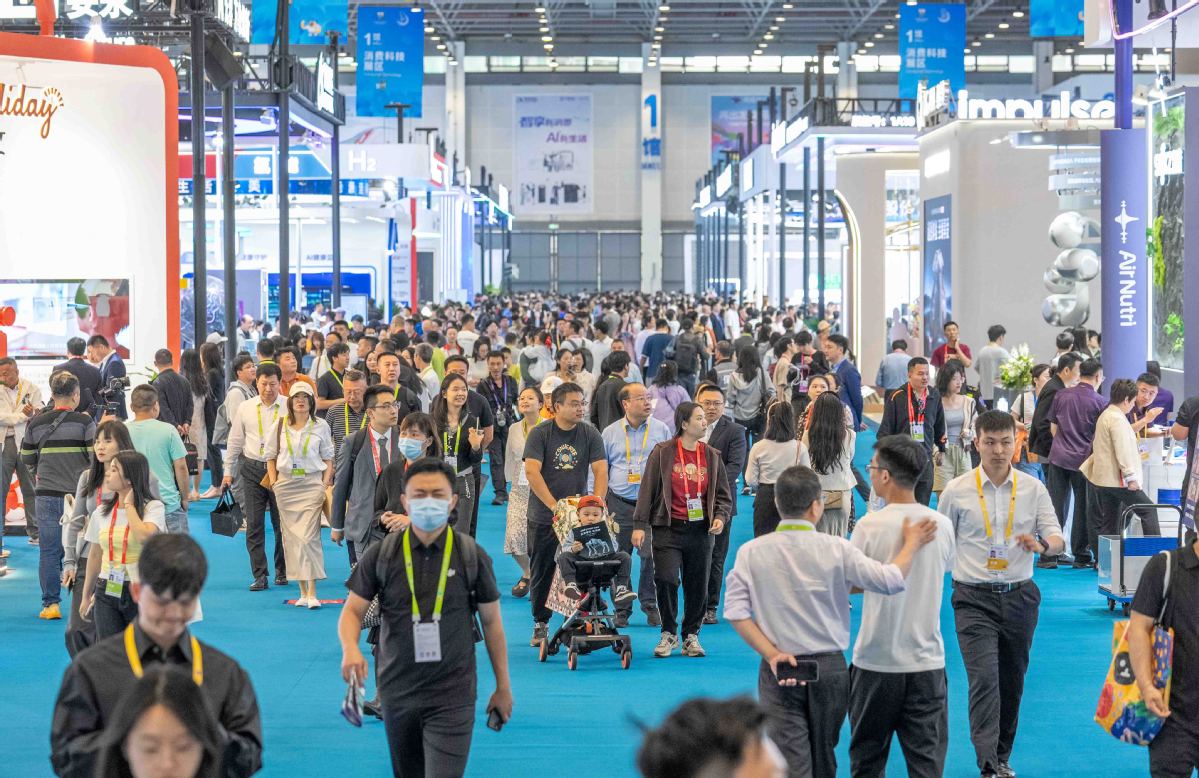
Officials highlighted Beijing's progress over the past five years in building an international consumption hub and outlining future plans and incentives. The event also spotlighted two key national initiatives—the Comprehensive Demonstration Zone for Expanding the Service Sector and the China (Beijing) Pilot Free Trade Zone—as growth drivers.
Organizers announced the 2025 China International Fair for Trade in Services will take place in September at Shougang Park, a newly developed convention complex. The fair will feature summits, exhibitions and business networking events. A 400-square-meter "Invest Beijing Reception Hall" showcased leading consumer brands, reflecting the city's global business ambitions.
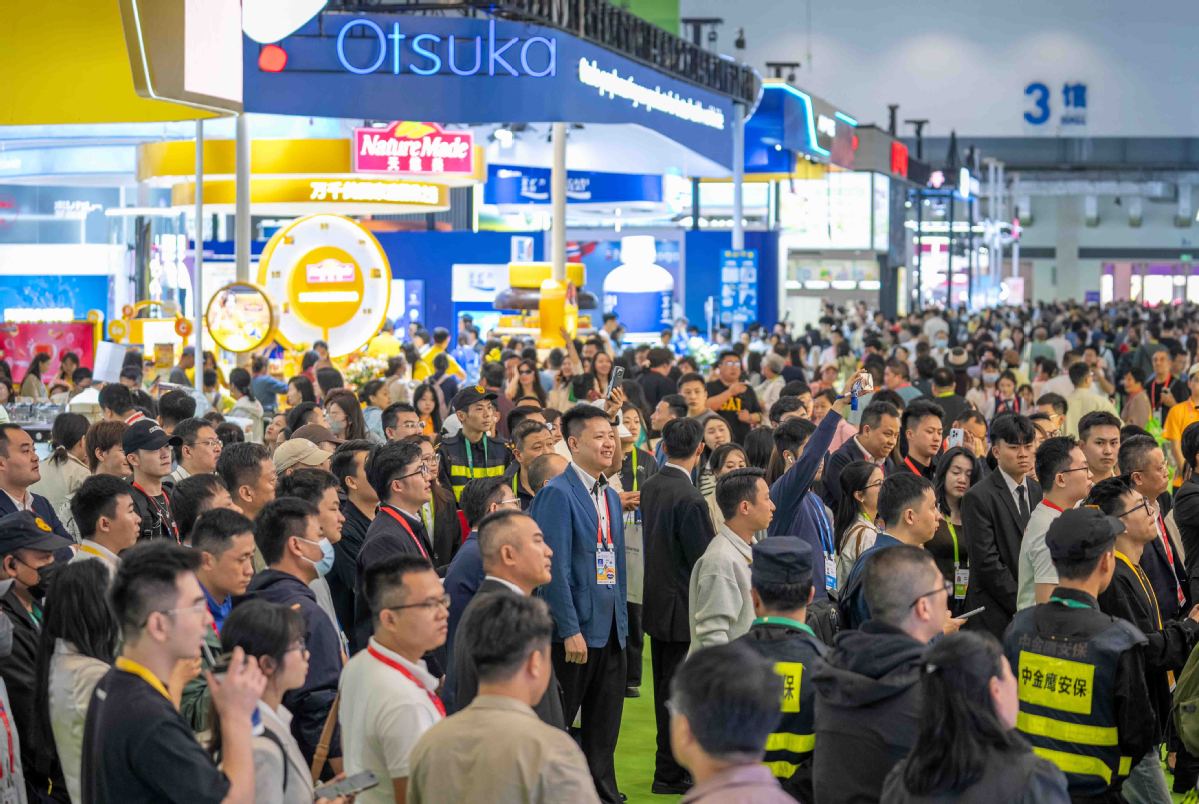
The Boao Lecheng International Medical Tourism Pilot Zone exhibited over 90 medical products, including breakthrough drugs, devices and imported health foods—many introduced for the first time at a major international expo. Interactive displays allowed visitors to explore advancements in oncology, cardiology, ophthalmology and medical aesthetics.
The zone also unveiled new health-tourism programs, digital platforms and patient-centered initiatives. Events like the "Lecheng Innovation Summit" aimed to spur discussions on medical consumption and global collaboration.
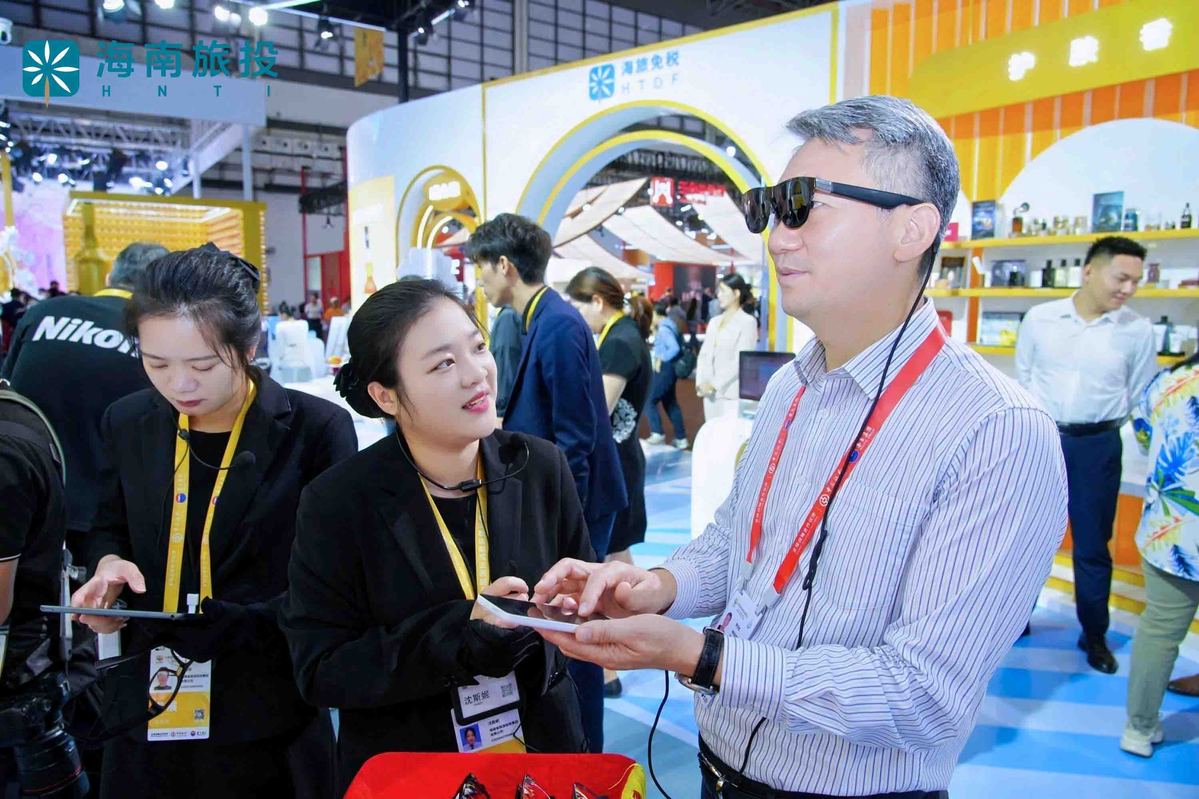
To enhance the expo experience, Hainan introduced 100 revamped local dishes, and 20 signature snacks selected for their innovative ingredients, techniques, and presentation. Highlights included coconut chicken soup and modern twists on traditional seafood.
The cuisine is featured in exhibitions, digital guides, and tasting events. A China-UK banquet and a Haikou night market blend food with cultural performances, while hotels and restaurants offer themed menus.
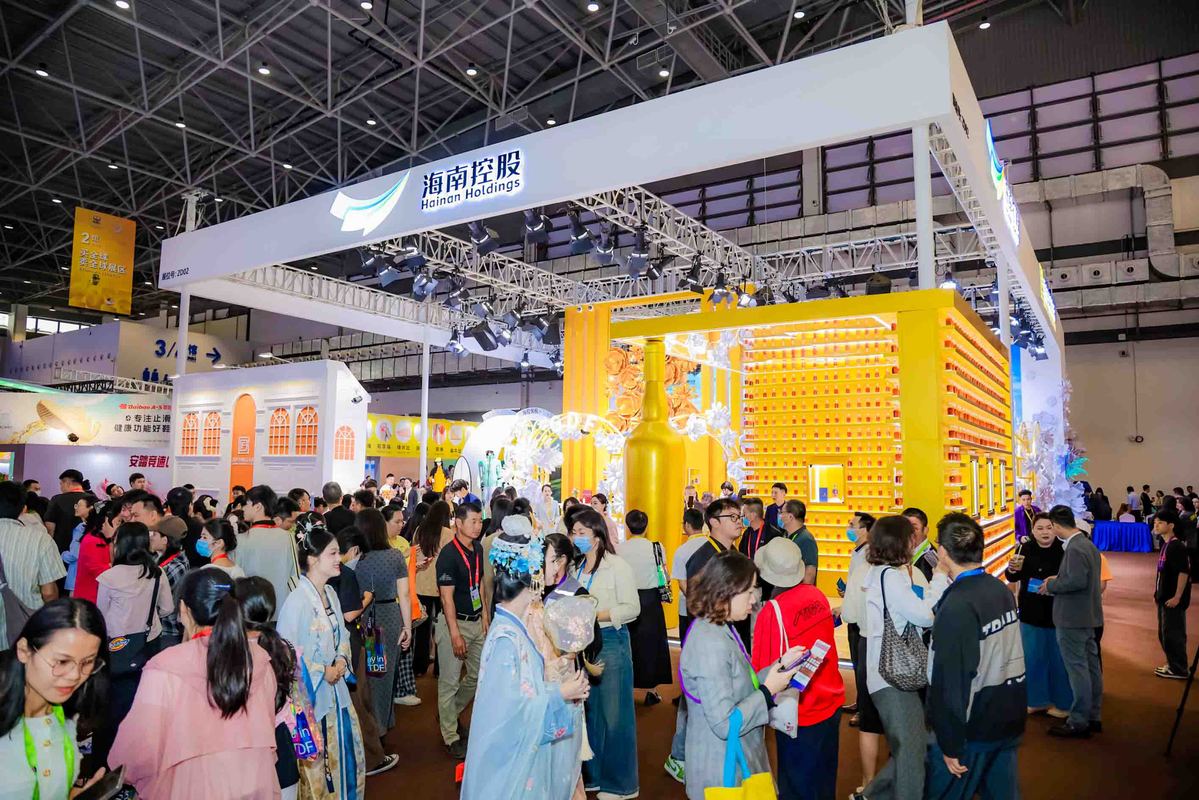
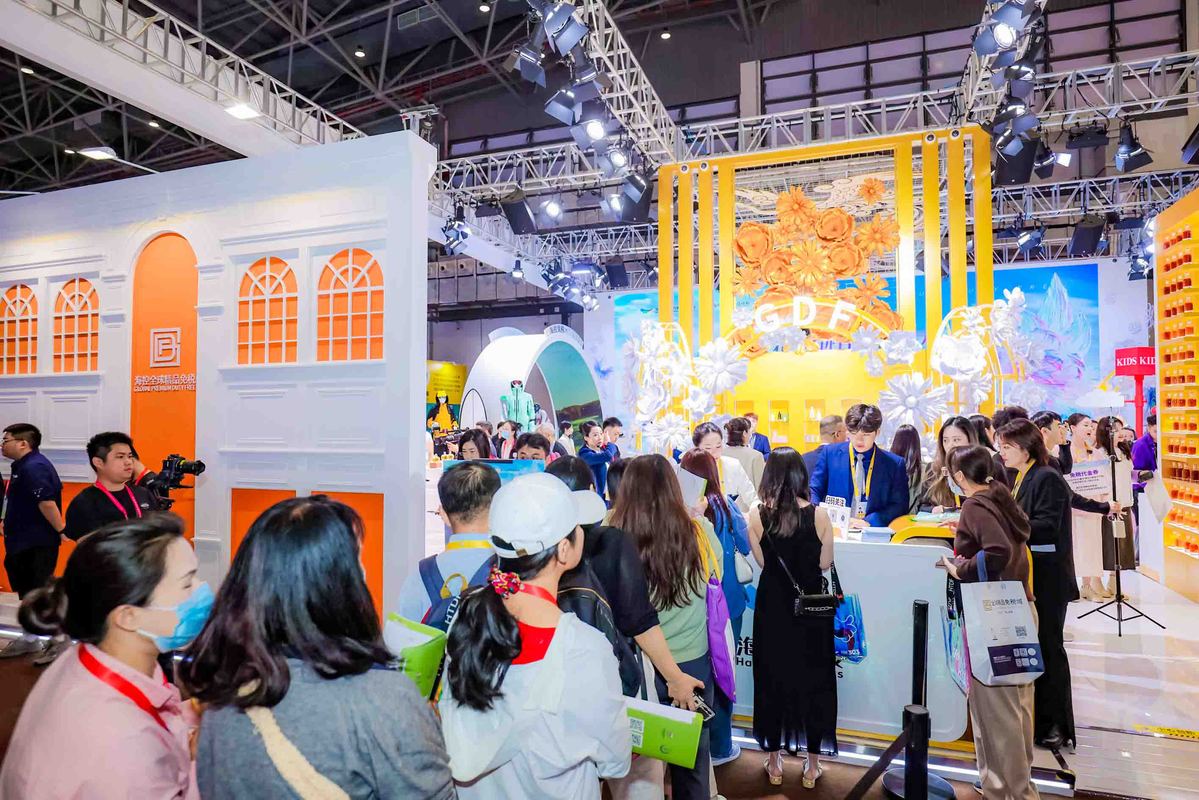
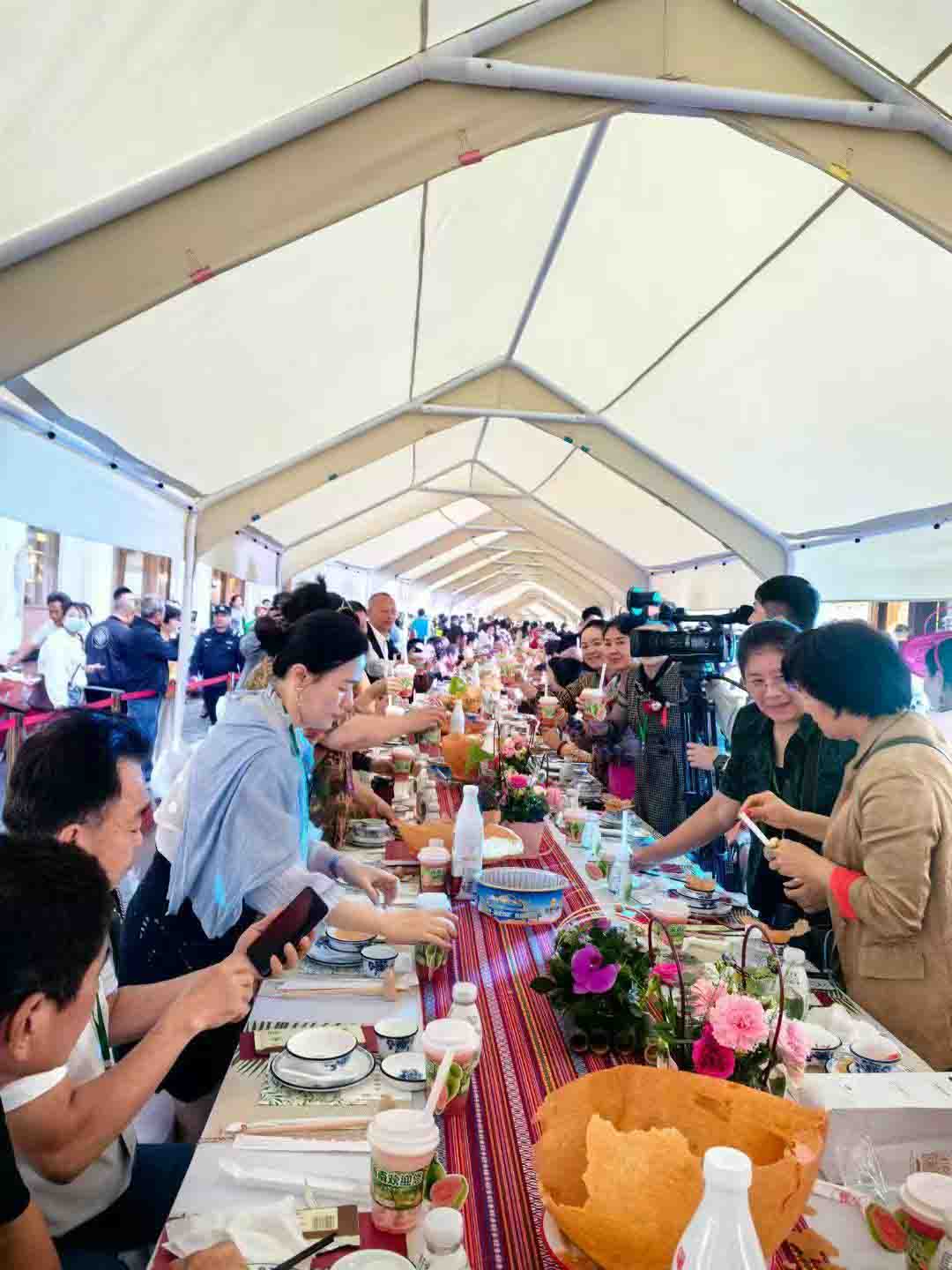
Technology is injecting new momentum into consumer markets, producing more diversified consumption scenarios to meet growing demand from consumers, said business executives at the ongoing fifth China International Consumer Products Expo on Monday.
With growing consumer awareness, skin care products are evolving beyond basic moisturizing and whitening to encompass areas like cellular repair and anti-aging within the biotechnology sector.
Zhao Yan, CEO of Bloomage Biotech, highlighted a shift in the roles of Chinese enterprises toward technology-driven and sustainable development.
"Synthetic biotechnology will drive ingredient innovation in fields such as cosmetics and food. The combination of AI with healthcare and cosmetics is giving rise to new scenarios like 'precision skin care' and 'intelligent health management'," she said.
Zhao further emphasized that China's significant market size and diverse product demands are continuously driving Chinese enterprises to innovate and improve quality.
This innovation is then transmitted through the supply chain to global markets, fostering greater efficiency and flexibility in the global industry chain.
Despite facing challenges like trade conflicts, Zhao said the company will actively advance its going-global strategy in the medical devices sector this year, focusing on markets in South America and Southeast Asia.
The food industry is also witnessing a trend toward technological advancement.
On the first day of the expo, CP Group and two other entities signed a strategic cooperation agreement, marking the first contract signing of the expo, with a project scale of 4.38 billion yuan ($600 million). This project aims to provide strong support for elderly health and chronic disease recovery through scientific diet and precise nutritional intervention.
In the field of transportation, Liu Hao, vice-president of electric vehicle brand Zeekr, also shared insights on smart car cabins, saying that today's car's system can understand user's experience and feeling, translating voice orders into actions.
Denis Cheng, EY Greater China consumer sector leader, highlighted the pervasive influence of AI in consumer settings.
"AI plays a vital role in empowering new consumer experiences, stimulating consumption, and driving investment demand," he said.
In discussing the impact of AI on consumer demands, Cheng noted, "AI has led to the creation of new consumer categories like smart homes, wearables, and innovative models such as intelligent health and elderly care, emphasizing 'self-enjoyment' and 'immersive experiences' in consumer preferences."
He highlighted the emergence of new consumer trends and growth opportunities, particularly in areas like green consumption, smart consumption and healthy living, underscoring the significant growth potential in these sectors.

Despite a complex and ever-changing international situation and with the process of globalization facing challenges, China has always embraced the world with its high-standard opening-up, attracting investments from many foreign enterprises.
Officials and top executives of foreign companies made the remarks during the ongoing fifth China International Consumer Products Expo in Haikou, Hainan province, the biggest ever compared with past editions, which points to the confidence of global consumer enterprises in China.
This year, the expo has attracted the participation of more than 1,700 companies and over 4,100 brands from 71 countries and regions. The exhibition area of US companies stands as the largest, with a total of 29 firms and 40 brands participating in the event, according to the Hainan provincial government.
"Facing a complex and ever-changing external environment, the holding of the expo has played a reassuring role for many foreign companies. They have indicated a high enthusiasm of cooperating with China and firmly believe in China's opening-up policy and the prospect of the Hainan Free Trade Port," said Huang Cui, deputy director-general of the Hainan Provincial Bureau of International Economic Development.
The United Kingdom serves as the guest of honor at the expo this year, and 27 UK companies participated in the event, including luxury brand Burberry, Denby Pottery, Loake shoes and Endura cycling gear.
Douglas Alexander, minister of state at the Department for Business and Trade of the United Kingdom, said: "We all have seen the tremendous innovation and growth taking place within China's economy in recent years, not least in digital technologies, life sciences and green energy, and areas which present significant opportunities for both our economies. So, we very much want to support British businesses big and small to seize the opportunities that the Chinese market offers. I look forward to discussing how we can unlock opportunities for increased trade and how we can realize a more prosperous future for both the UK and China."
Alexander said the UK is keen to explore the opportunities for free and open trade — trade that benefits both Chinese and British firms.
Besides the UK, France, Switzerland and Slovakia are also showing their products in the form of national exhibition venues.
Denisa Sakova, deputy prime minister of Slovakia, said Slovakia is grateful for the openness and willingness of China to create favorable conditions for the development of trade and investment cooperation.
The volume of foreign trade between the two countries is continuously increasing, and Slovakia aspires to become a reliable and responsible partner that contributes to economic growth and innovation for both sides.
CP Group, a Bangkok-based firm and a five-time participant at the expo, said it has developed industrial parks that integrate coffee planting and coffee cultural and tourism in Xinglong, Hainan. Next, it plans to build a modern agricultural food industry park with tropical and efficient agricultural features in the province.
"By utilizing our global resources, we would like to promote more products from Hainan and other parts of China to Thailand, Southeast Asia and the world," said Xie Yi, senior vice-president of CP Group.
Denis Cheng, consumer sector leader of EY Greater China, said with the government's multiple favorable policies that aim to boost consumption, China's overall consumption market is expected to show a stable and positive growth trend this year.
As China has expanded the scope of its consumer products trade-in programs, the consumption potential of durable consumer goods is expected to be further boosted this year, Cheng said, adding that new demand and new technologies will help fuel more consumption hot spots and growth points, and emerging sectors such as green, smart and health consumption are likely to embrace more growth opportunities.

HAIKOU - A seamless integration of cutting-edge technologies into daily life is taking center stage at the ongoing fifth China International Consumer Products Expo (CICPE) in South China's Haikou city, painting a vivid picture of a smarter, more interconnected future.
Slated from April 13 to 18, this year's expo features dedicated exhibition zones for groundbreaking innovations in artificial intelligence (AI) and low-altitude economy for the first time.
Tech giants like Huawei and China Mobile are showcasing futuristic solutions. Huawei's HarmonyOS ecosystem demonstrates cross-device synergy across "people, vehicles, and homes," featuring AI-powered eye-tracking technology for hands-free e-book navigation.
China Mobile's smart home ecosystem includes quadruped robotic companions for elderly care and AI-driven home security systems.
"AI is accelerating its integration into everyday scenarios. The expo is undoubtedly a major platform to showcase these advances," said Zhan Wenyu, vice-president of AI company iFLYTEK, which has participated in the expo for five consecutive years.
The expo's dedicated AI zone displays humanoid robots capable of complex tasks, such as dancing in traditional local Li ethnic brocade costumes or handling delicate objects.
Tesla's latest humanoid robot boasts enhanced mobility and tactile sensitivity, while the Ti5 Robot unveils breakthroughs in electric drive technology with lightweight joint modules and smart dexterous hands.
Health and wellness technologies also claim a prominent spotlight. Continuous glucose monitors and light therapy glasses under various brands further spotlight the fusion of tech and well-being, while brain-computer interfaces highlight advancements in medical accessibility. Companies like SenseTime and Asus are presenting smart health ecosystems at the event.
Brands like OSIM and Ogawa have debuted AI massage robots. Air Nutri Solution Inc., a Vancouver-based non-medicinal sleep solutions provider, introduces its "deep sleep cabin," which uses charged particle waves to create immersive rest environments.
The OSIM sees the expo as a key platform for engaging in meaningful conversations with global consumers, said Lin Xiaohui, deputy general manager of brand management and marketing of OSIM North Asia.
Making its debut this year, the low-altitude economy zone showcases electric vertical takeoff and landing (eVTOL) aircraft, flying cars, and drones.
Autonomous vehicles served expo attendees, offering driverless shuttles and cleaning services around key venues, providing a glimpse into smart city logistics.
United Aircraft brought the TD550, which obtained the first type certificate for unmanned helicopters in China, to the exhibition. "China is entering an era of rapid development of the low-altitude economy," said Zhou Xiaoyue, director of the firm's public relations.
"The Hainan Free Trade Port provides unprecedented opportunities for the innovation of the drone industry," Zhou said, adding that the firm will work with global partners through the expo platform to promote the industrial implementation of the low-altitude economy.
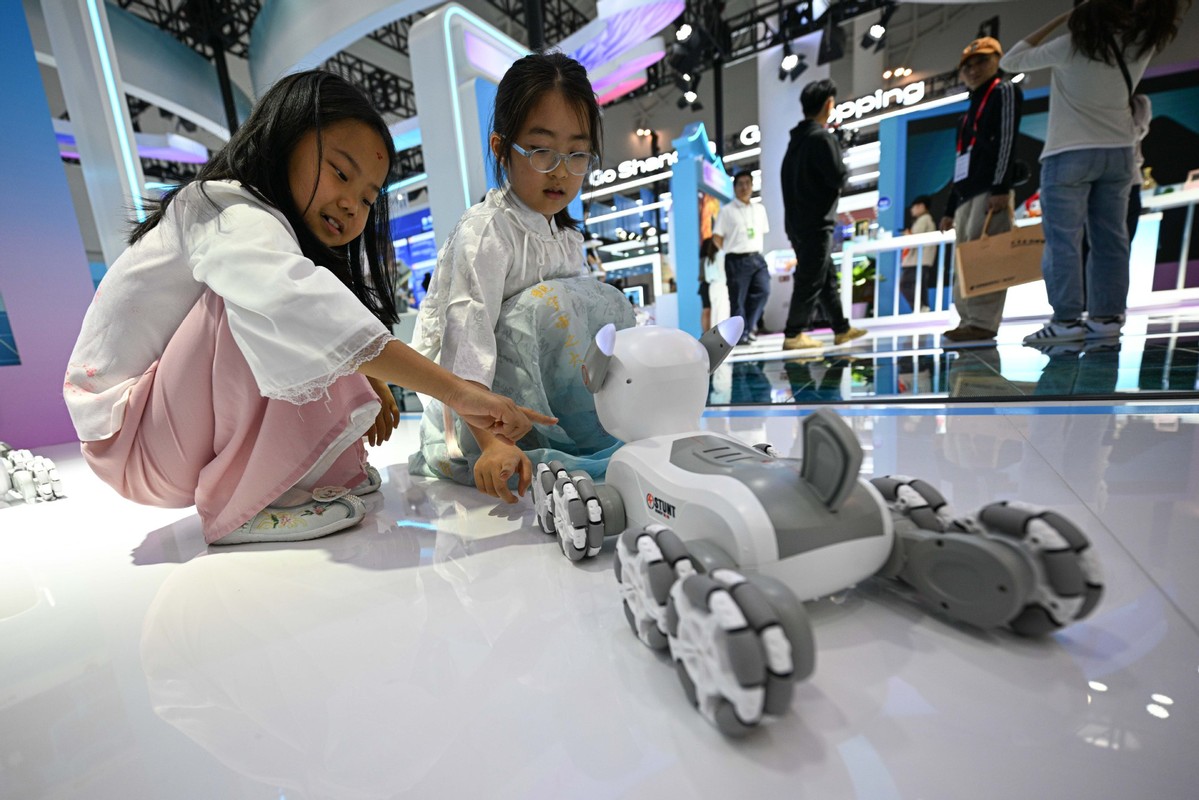
As China's only national-level exhibition focused on consumer goods, this year's edition emphasizes innovation and global collaboration. The expo has drawn the participation of over 4,100 brands from over 70 countries and regions.

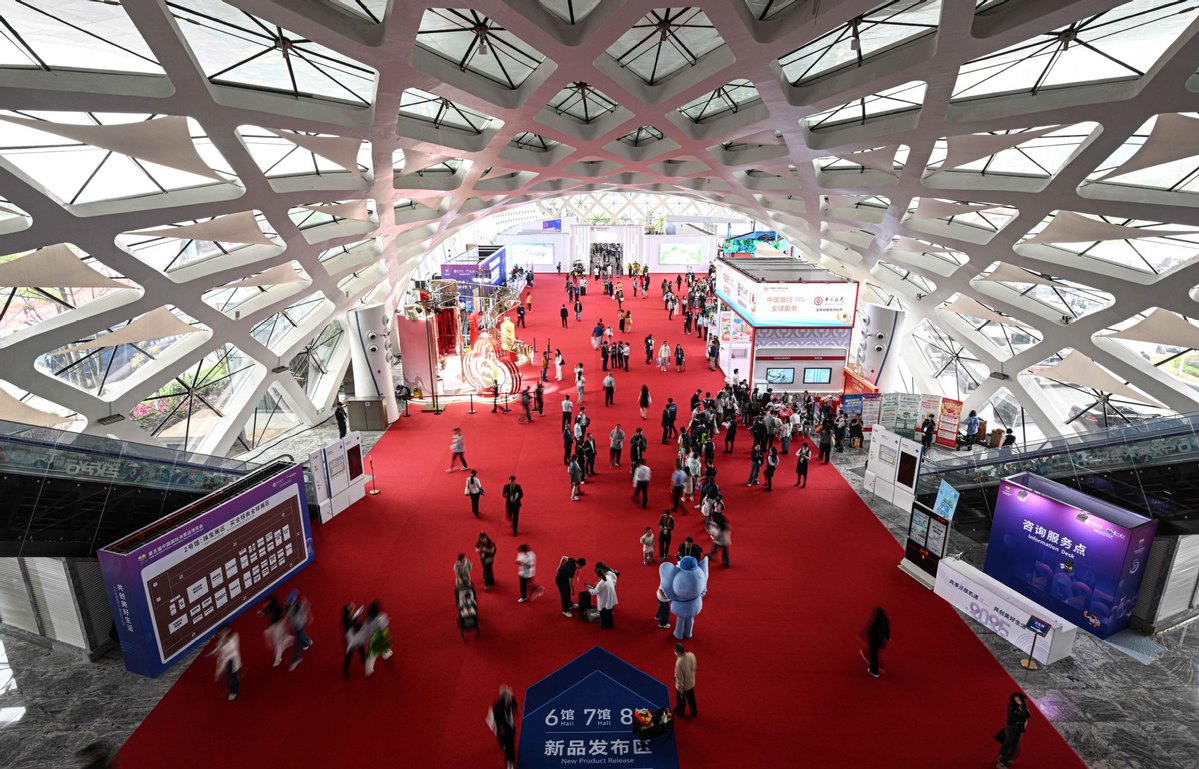
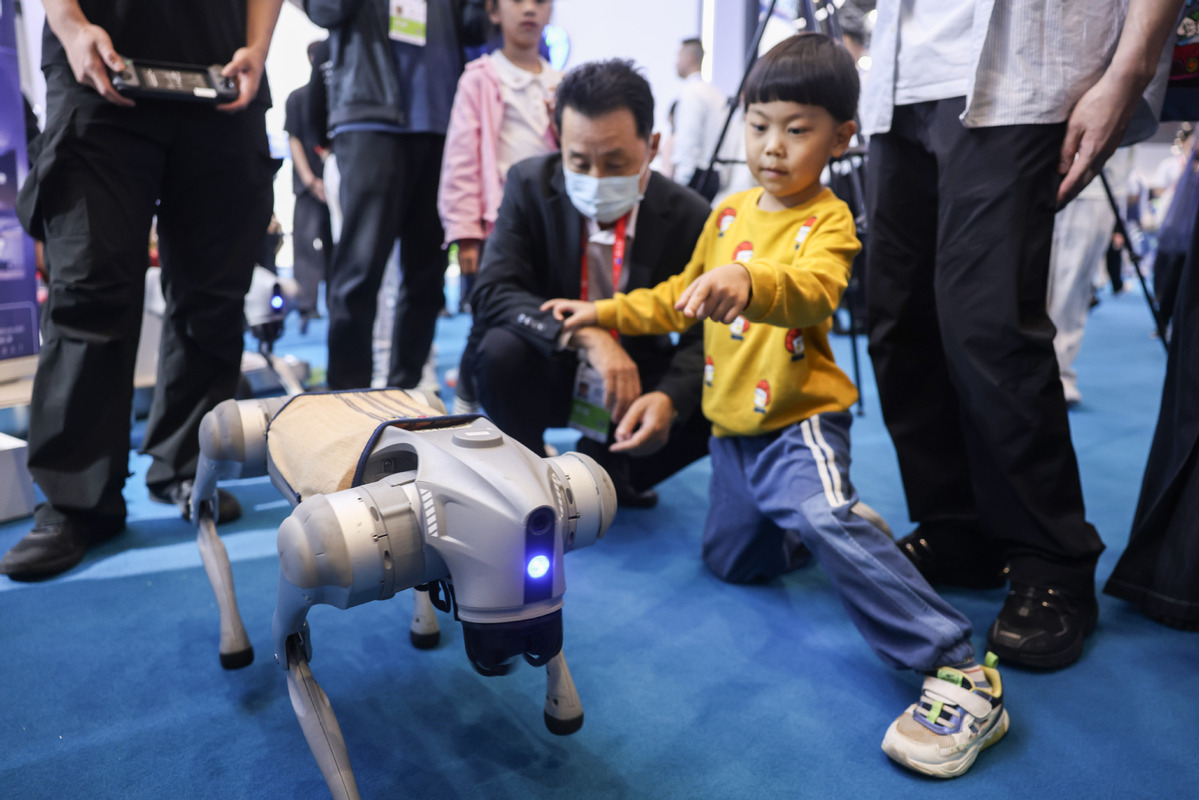
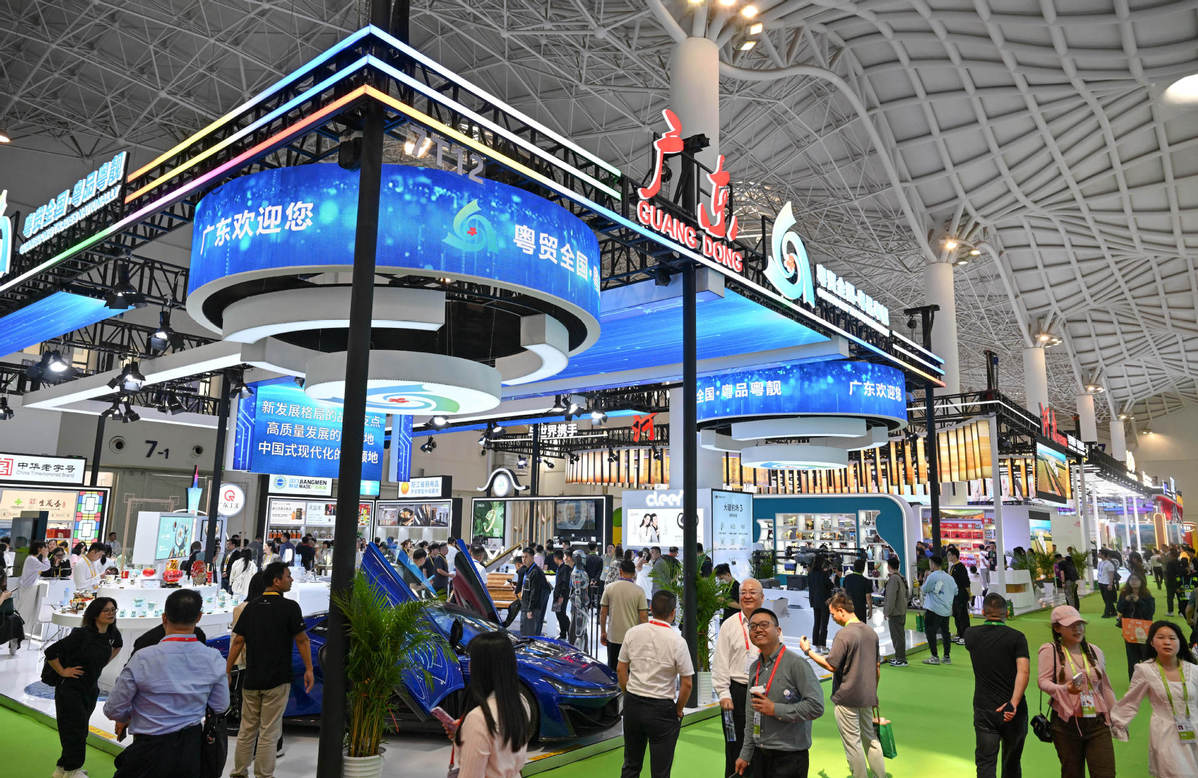
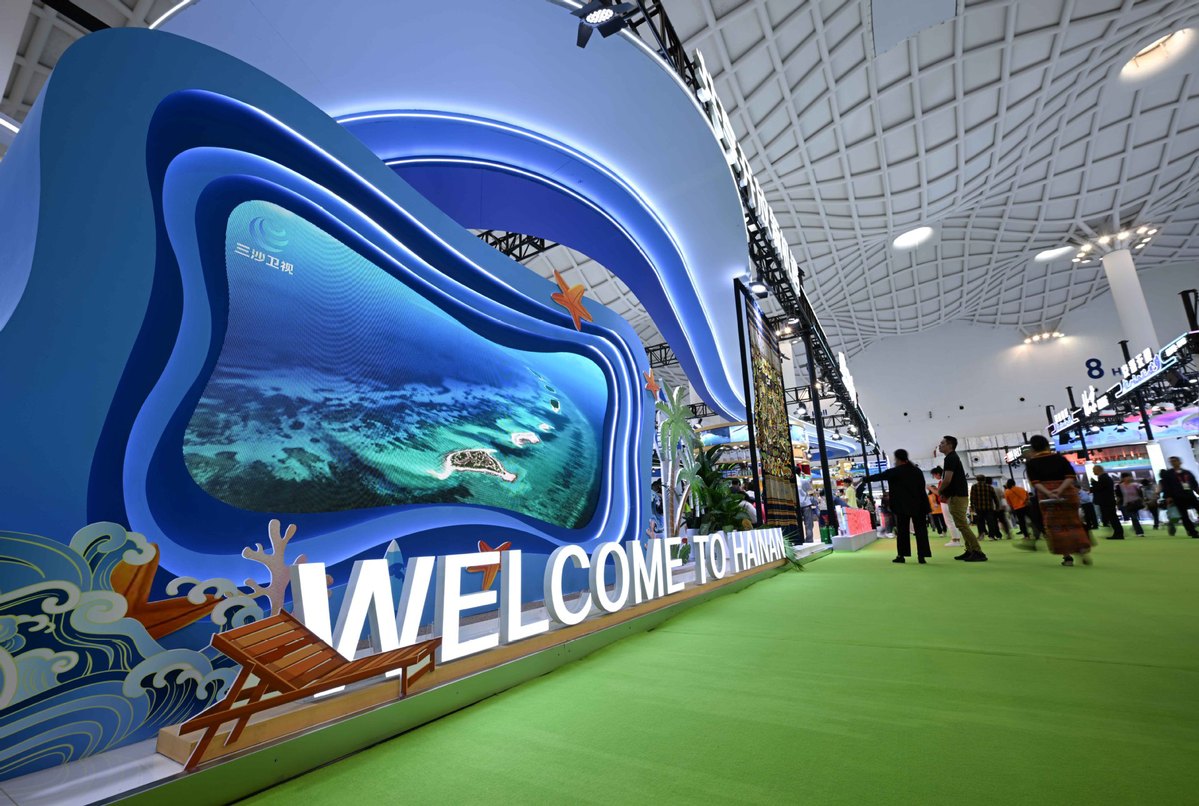
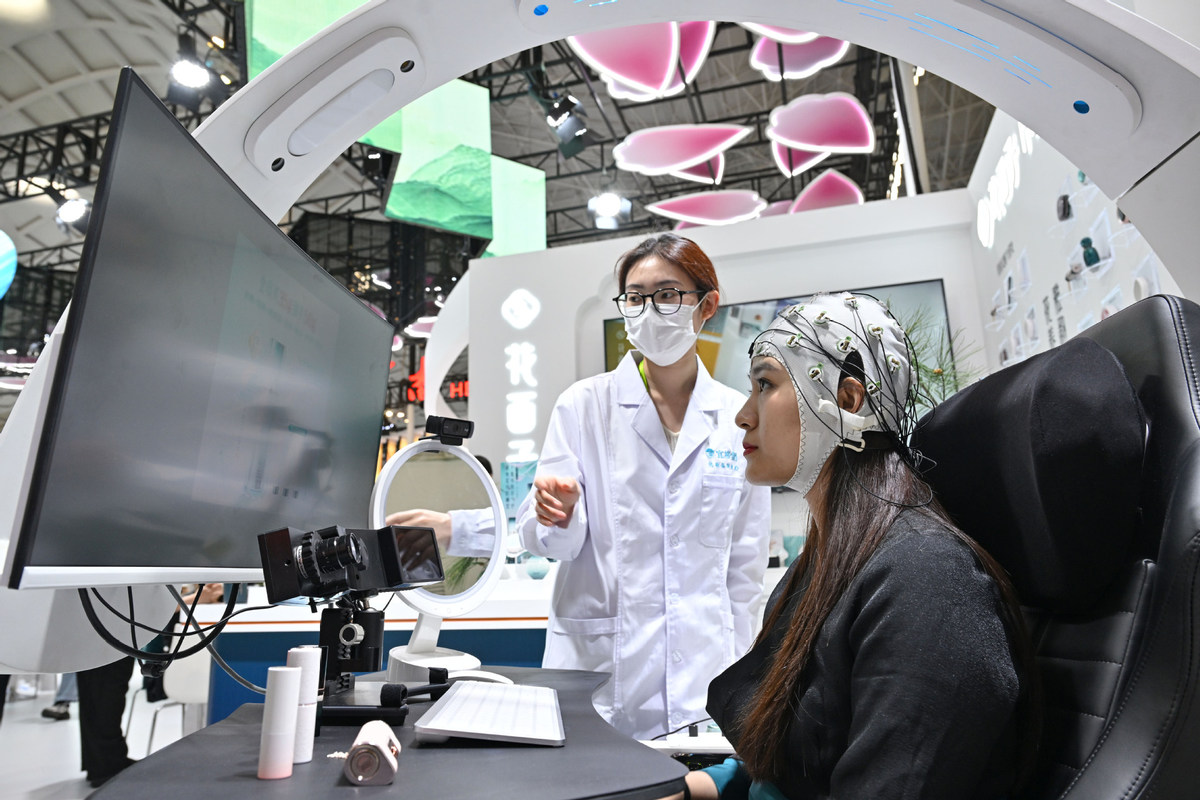
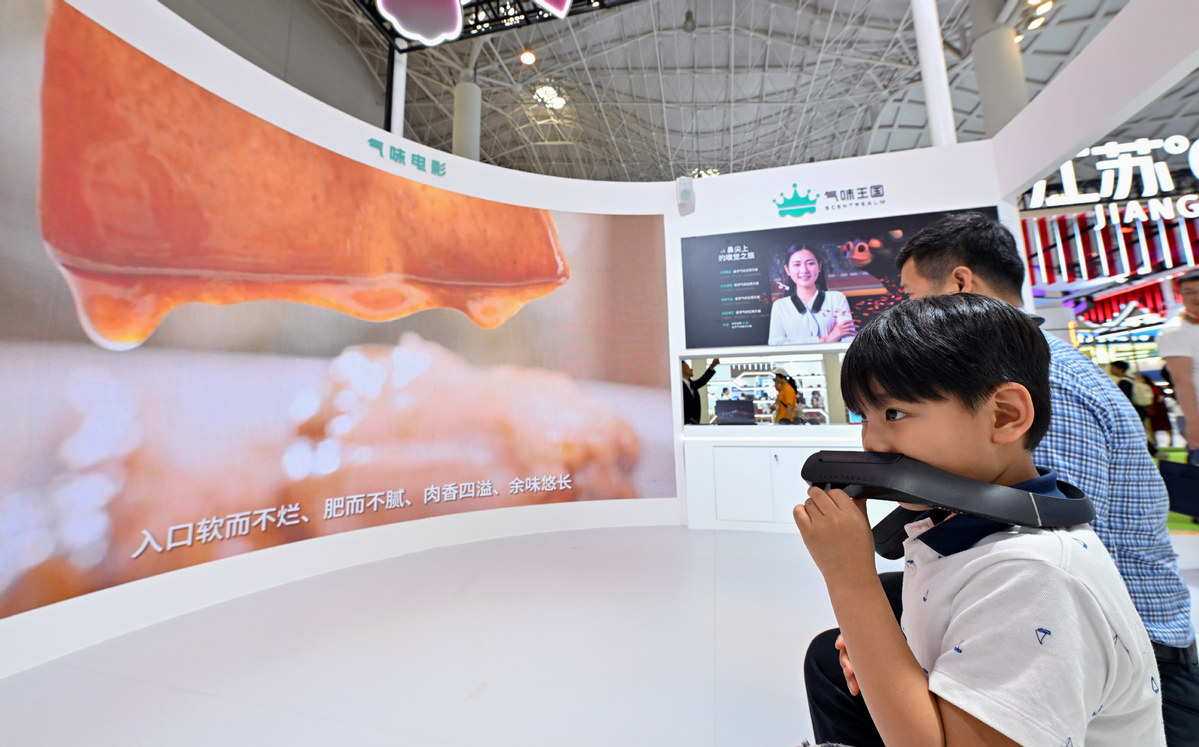
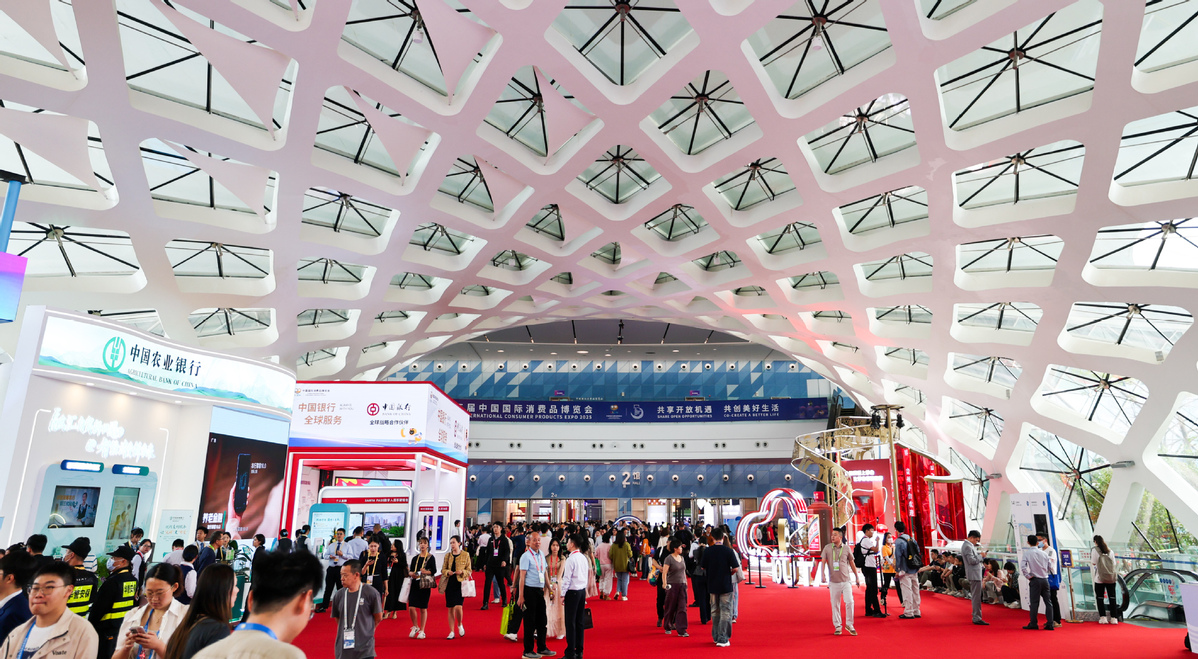
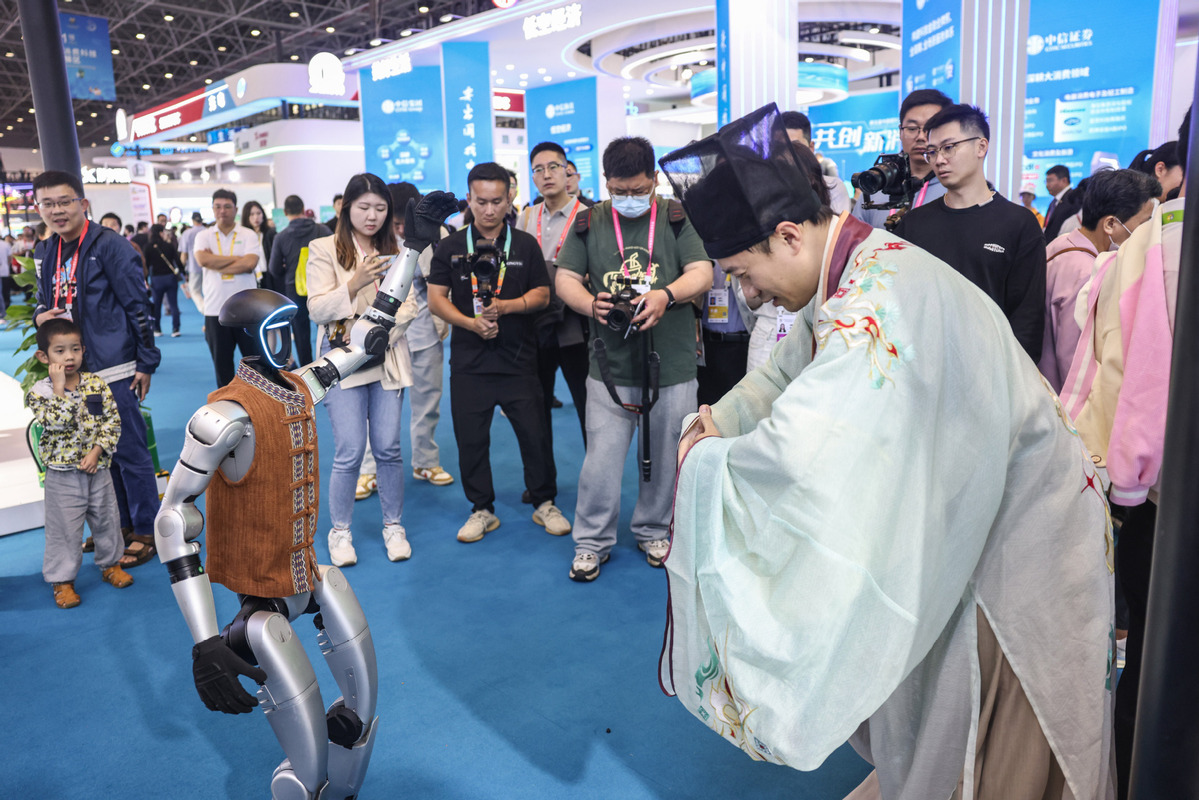
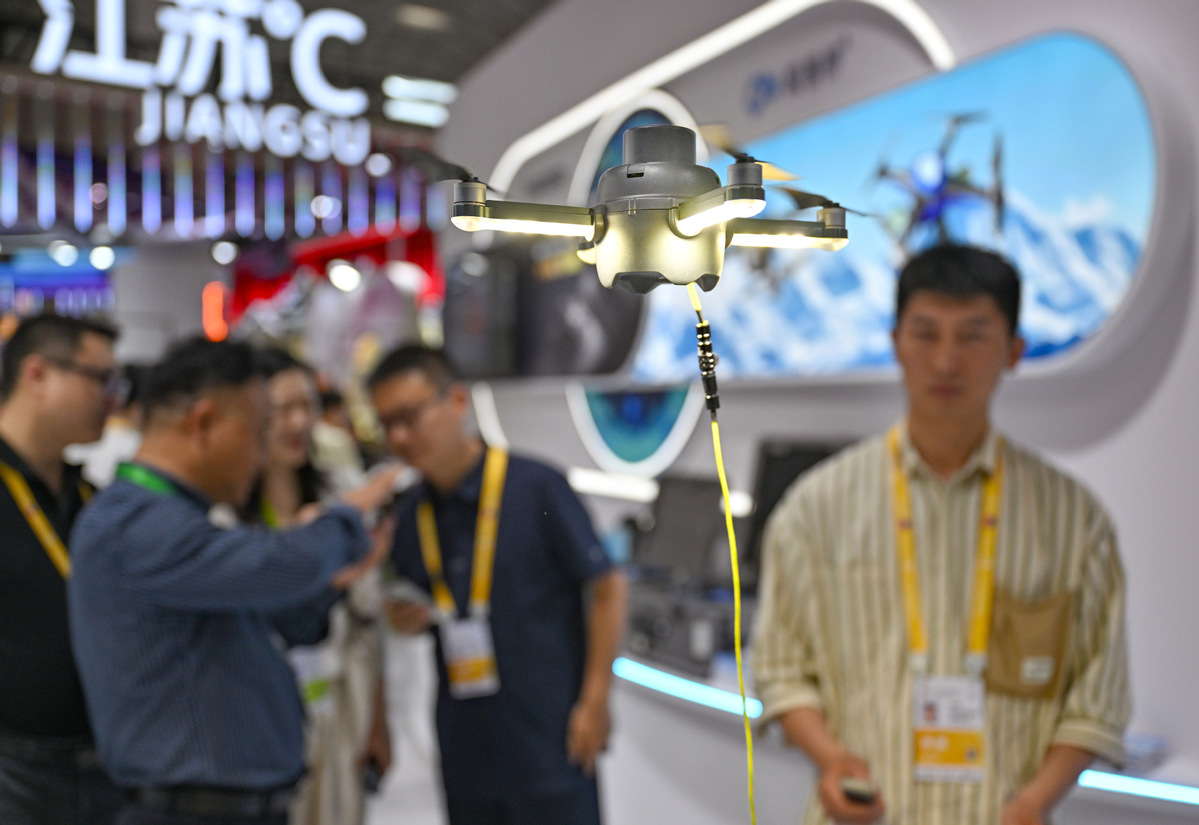
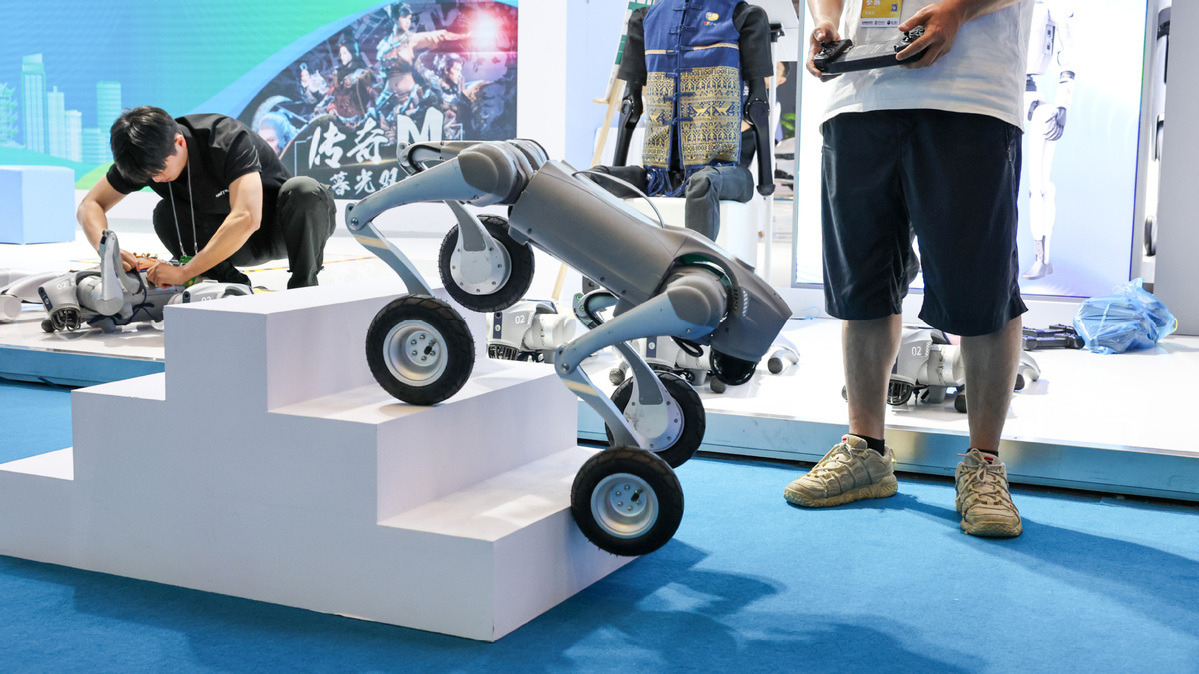
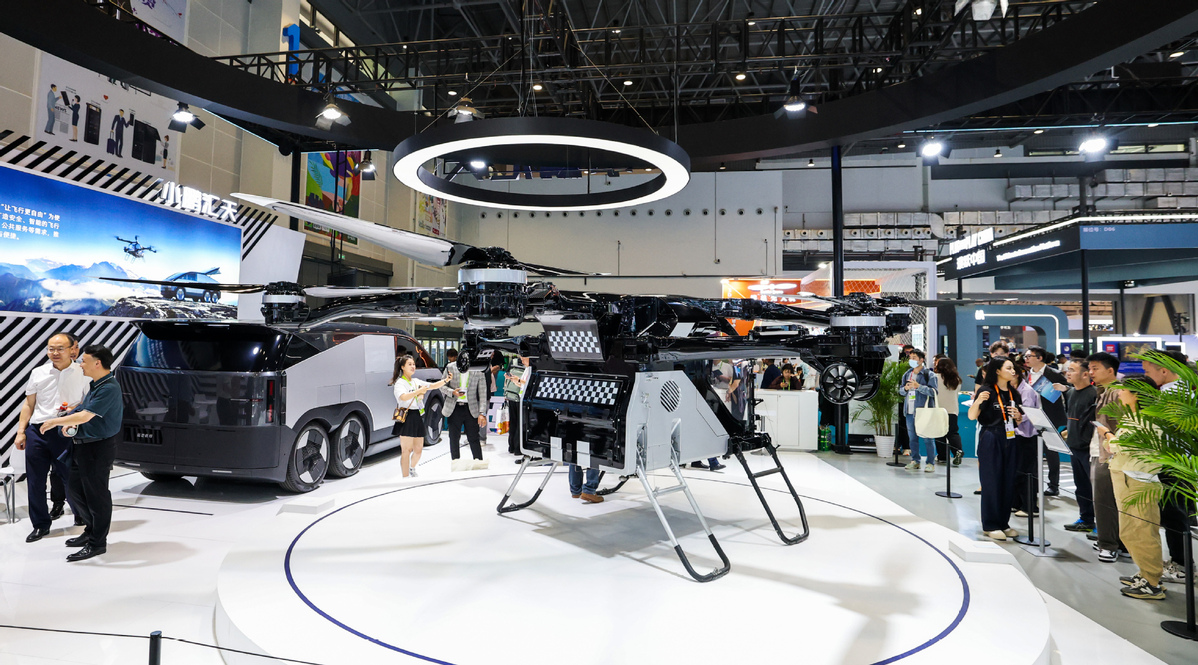
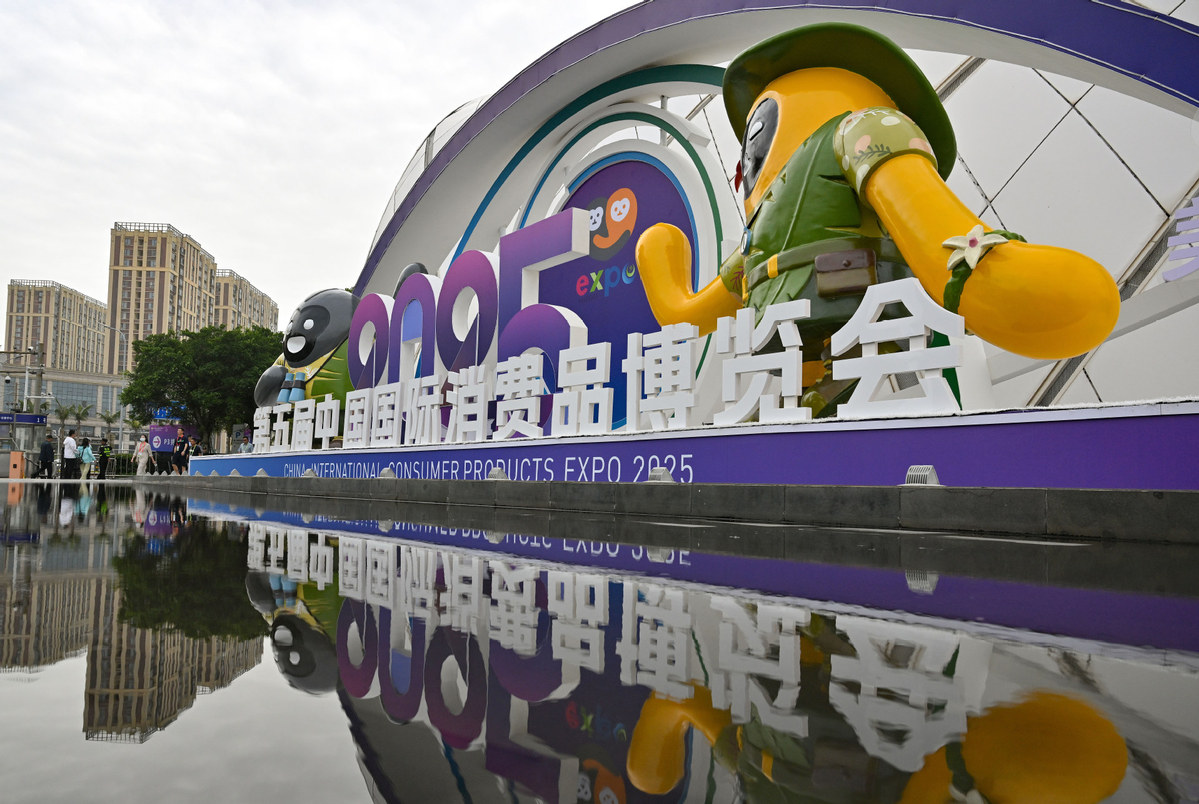
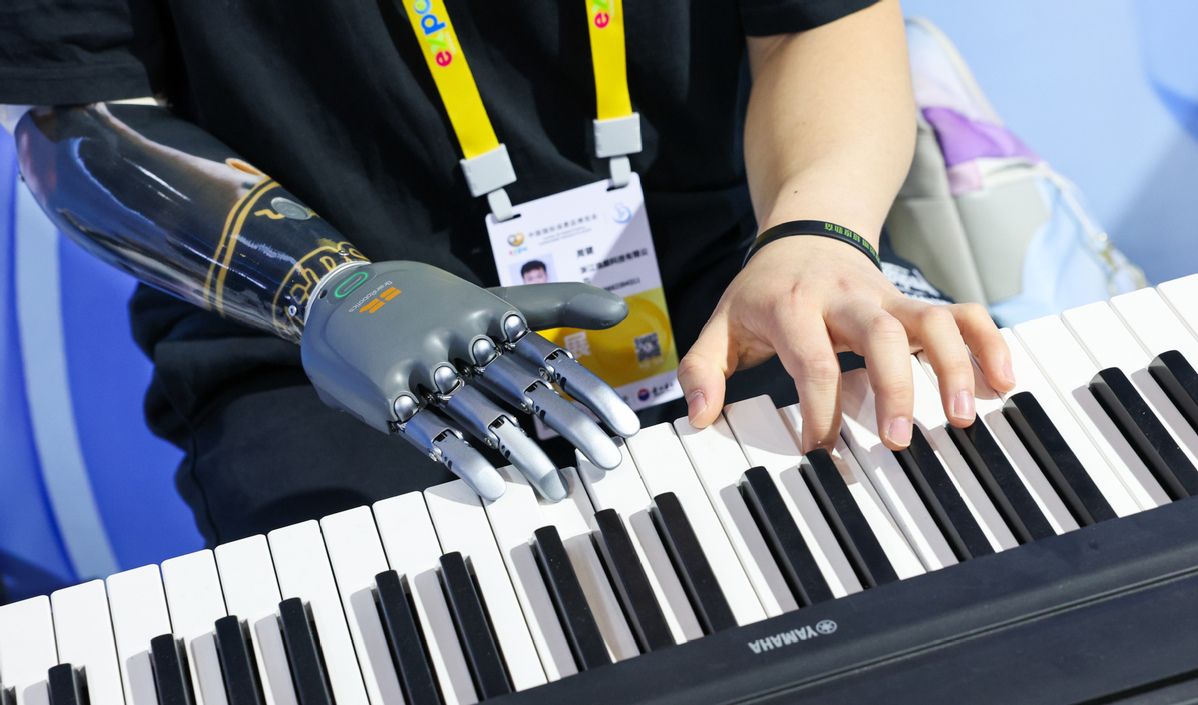
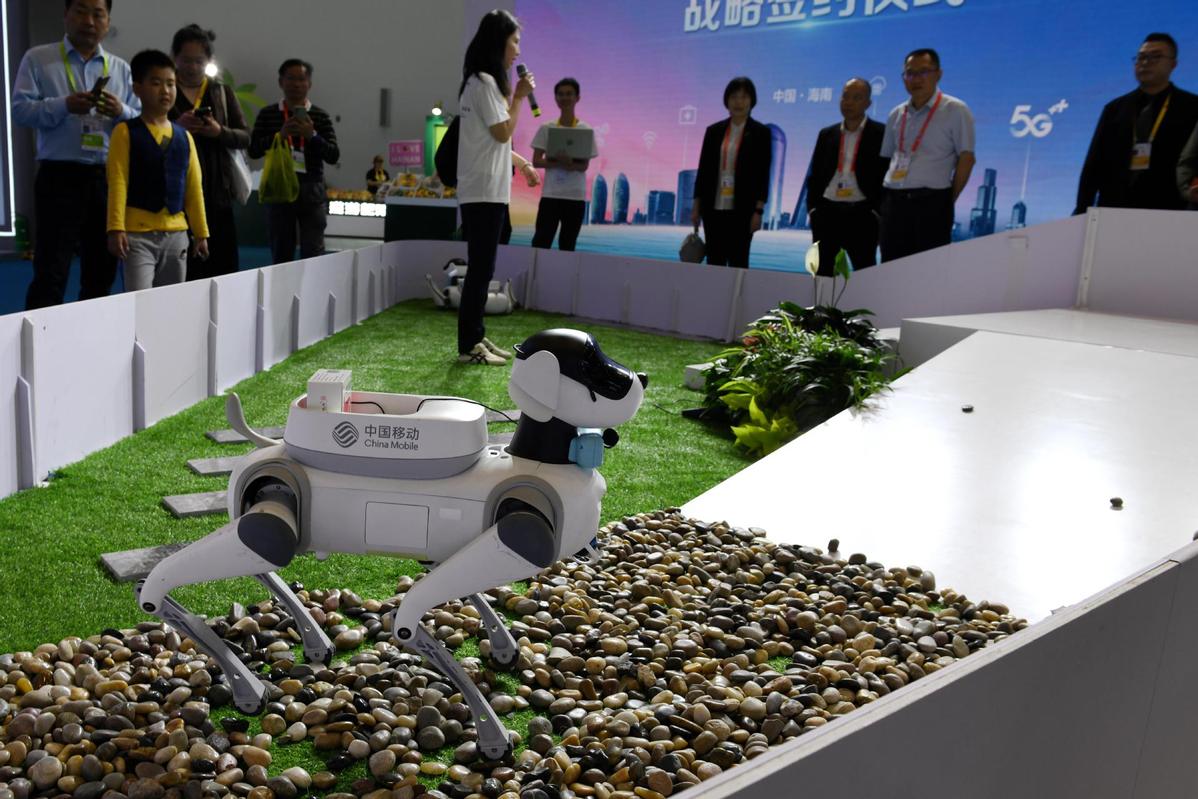
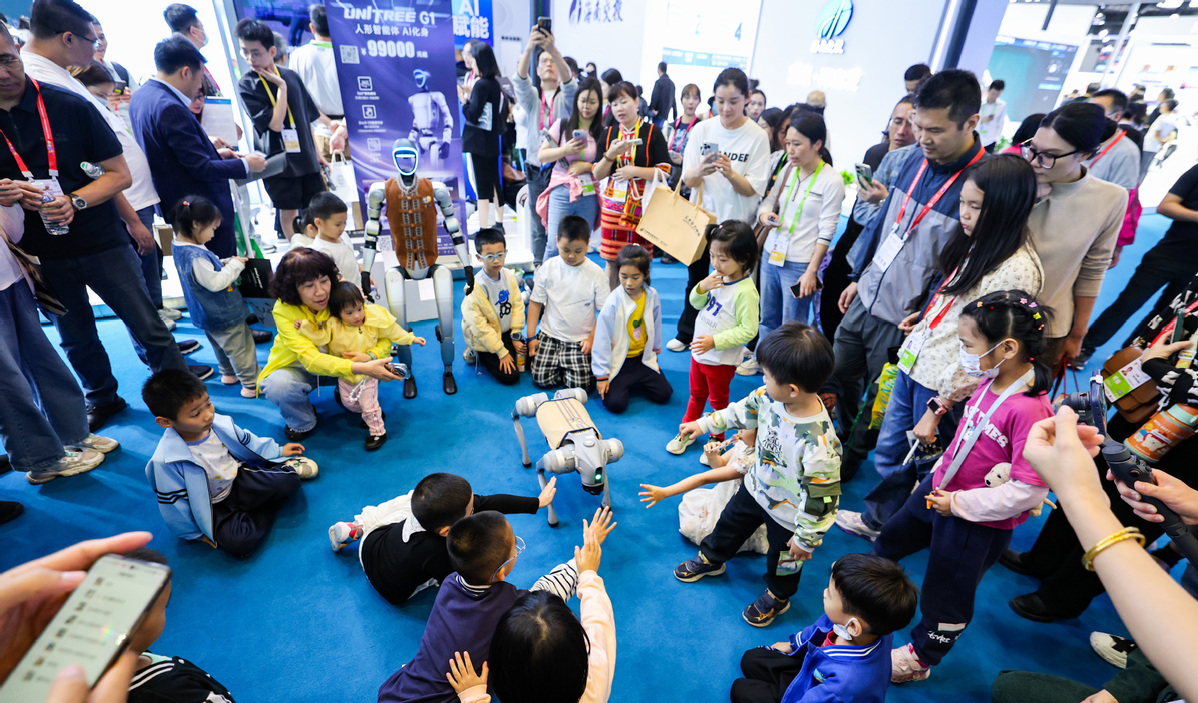
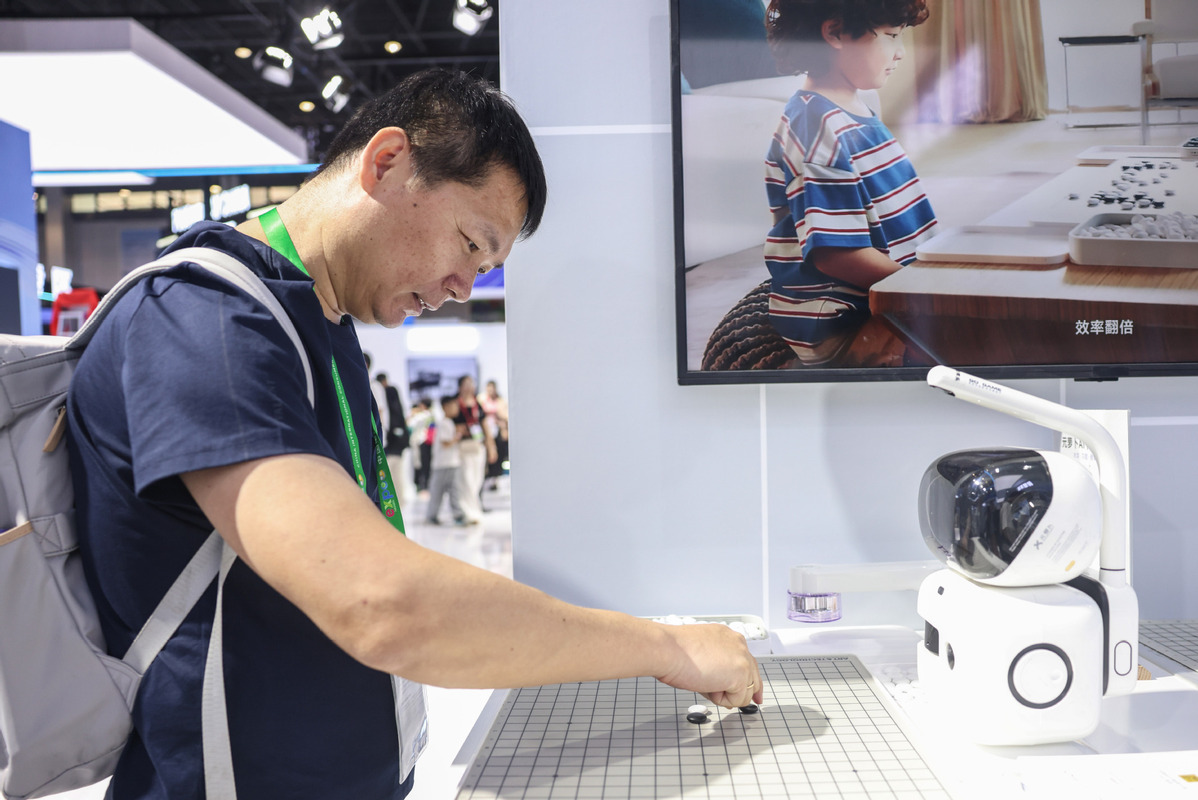
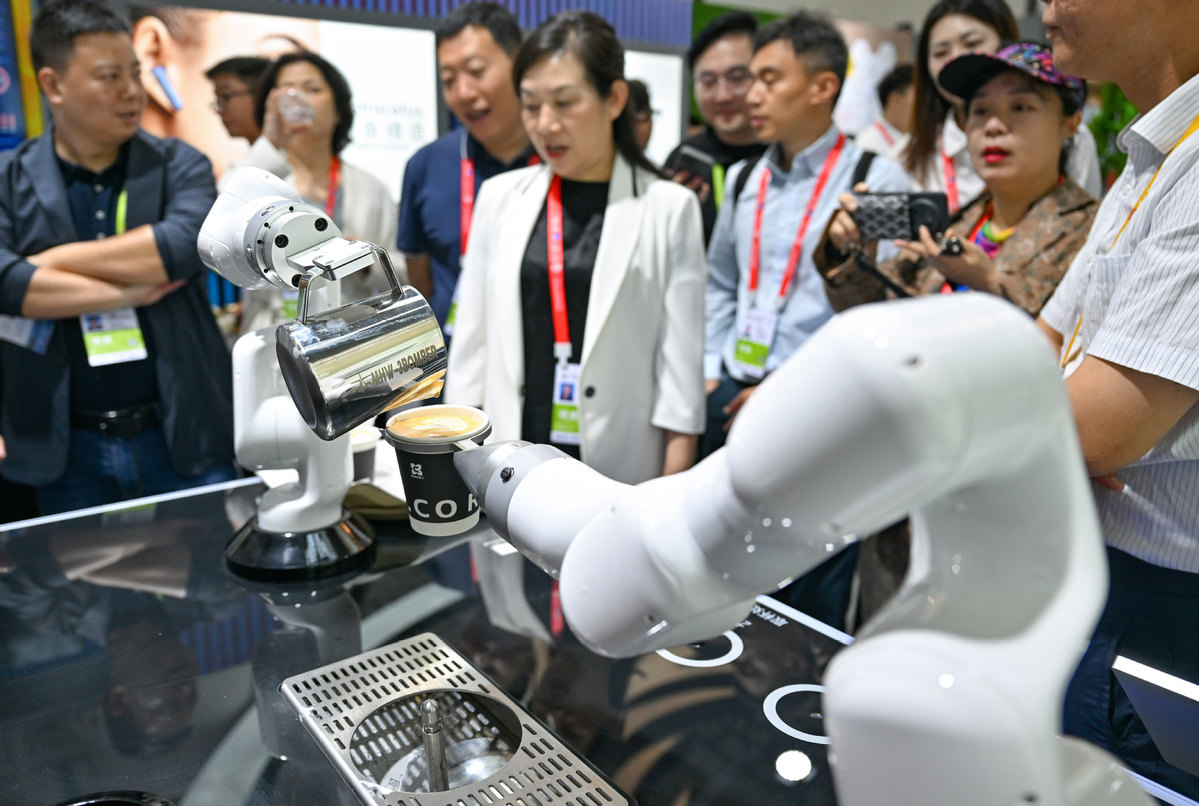
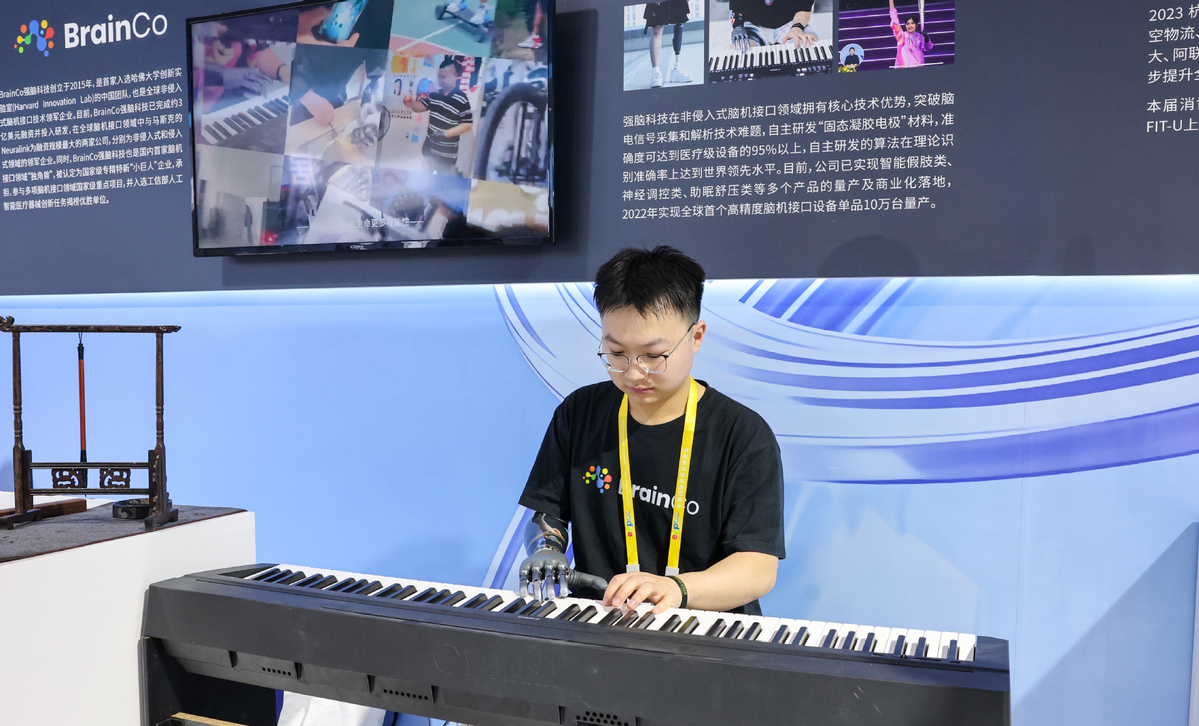
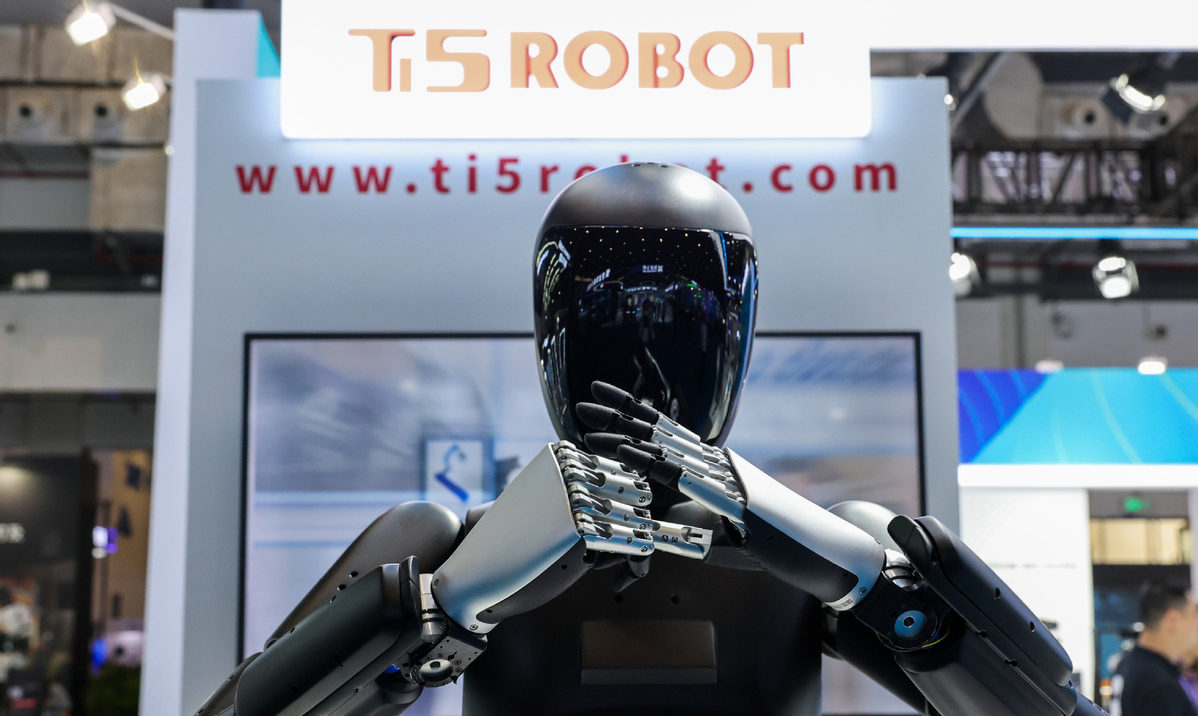
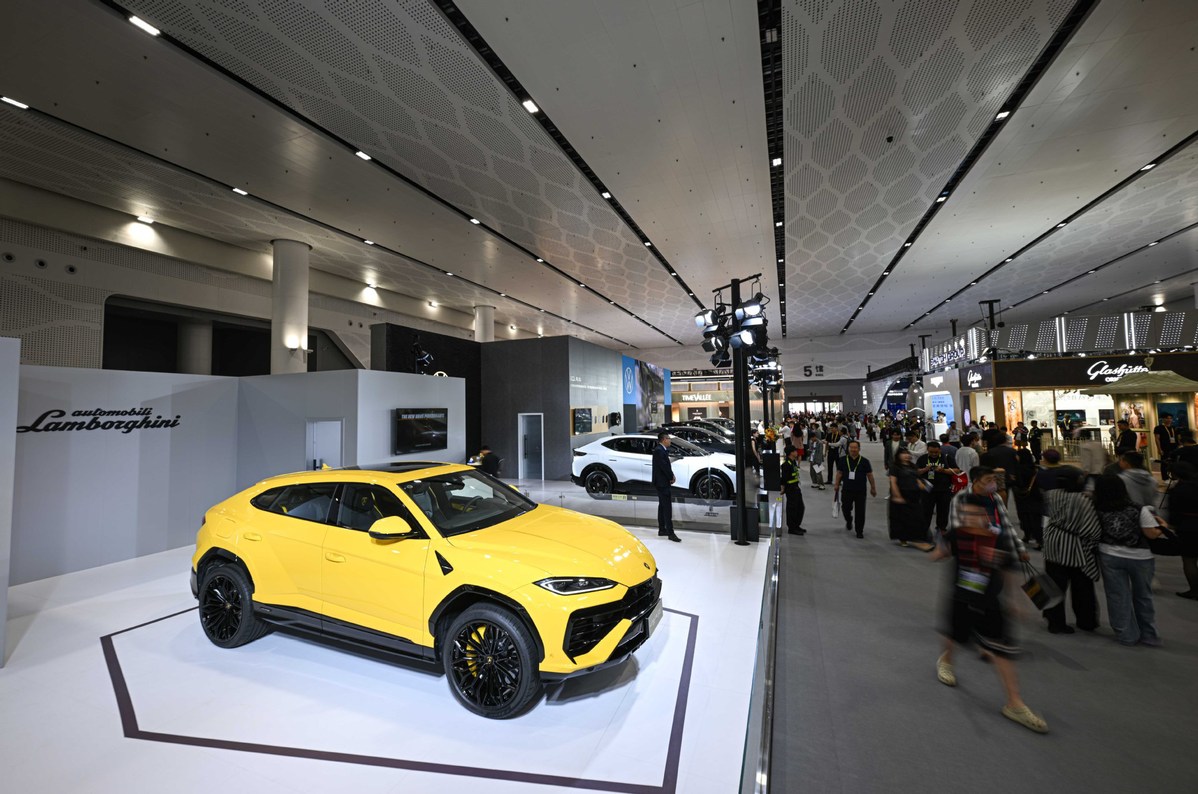
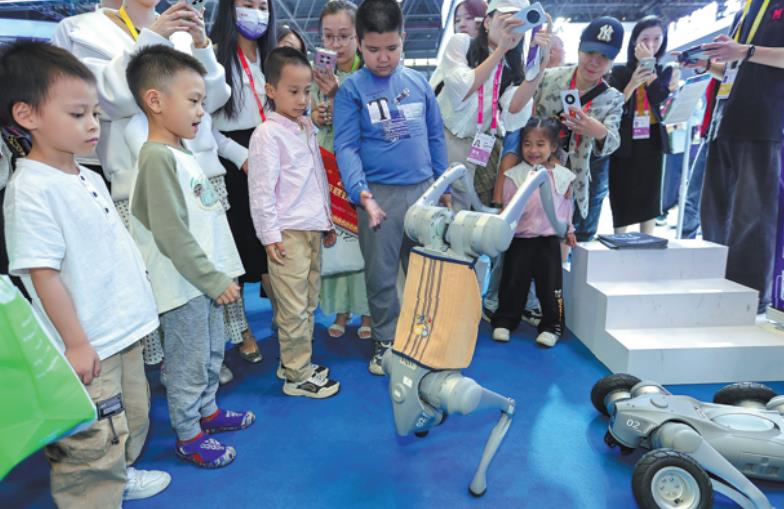
China's super-large consumption market still holds enormous potential and serves as an important engine to drive economic growth, despite the increasing complexity and uncertainty of the external environment.
Industry experts and top executives made the remarks during the 5th China International Consumer Products Expo, which opened on Sunday in Haikou, Hainan province. The expo runs through Friday.
Chinese Vice-President Han Zheng attended the opening ceremony and announced the opening of the event.
Amid tariff increases by the United States and growing economic fragmentation worldwide, consumption is playing an important role in driving domestic economic growth.
China wields great power when it comes to tackling trade conflicts, as it has a huge consumption market with 1.4 billion consumers, and with the ongoing consumption upgrade trend, the country has a lot of opportunities to expand the domestic trade market, said Peng Jianzhen, president of the China Chain Store and Franchise Association.
"When faced with difficulties, we unite as one and work together to distribute high-quality foreign trade products to the domestic market. That's where China's confidence of taking countermeasures comes from," Peng said.
Zhang Xiangchen, deputy director-general of the WTO, delivered a speech via video link to the expo and said that a stable and predictable international trade system based on fair and transparent rules is essential for sustained global prosperity. History has shown that while protectionist policies may offer short-term benefits, they ultimately hinder long-term economic growth.
Speaking at the expo, Sheng Qiuping, vice-minister of commerce, said with the increasing complexity of the external environment, China's foreign trade is bearing certain pressures.
"With continuous efforts of various policies to expand domestic demand and promote consumption, residents' consumption ability is gradually improving, and new technologies and new business formats have continued to emerge in the country. The advantages of China's super-large scale market are expected to become more prominent," Sheng said.
In the first two months, the total retail sales of consumer goods in China reached 8.37 trillion yuan ($1.15 trillion), up 4 percent year-on-year, with the growth rate 0.5 percentage points higher than all of last year, the ministry said.
German carmaker Volkswagen Group participated in the expo for the third time this year, and it is bullish on the growth potential of Hainan, as well as China's further reform and opening-up prospects.
"Since 2020, we have added another 10 billion euros of investment in China, and in 2023, we invested 7 billion yuan to build the world's largest research and development center outside of Germany and in China. This also indicates that China has become a global source of technological innovation," said Su Bahong, vice-president of Volkswagen Group China.
Meanwhile, British luxury brand Burberry has been a five-time participant of the expo. The company said over the years, it has seen the expo as an important platform to help further boost consumption and expand high-quality development in the Chinese market.
